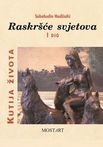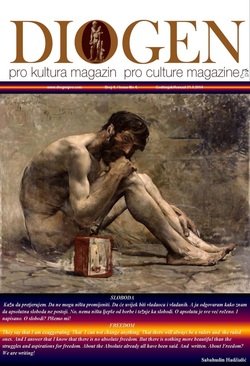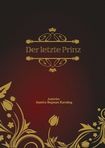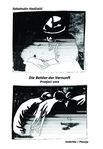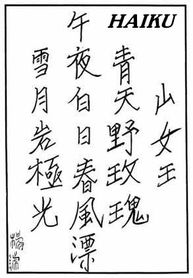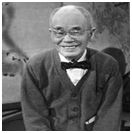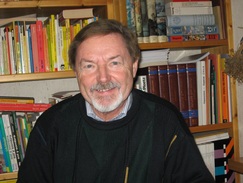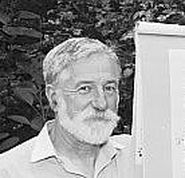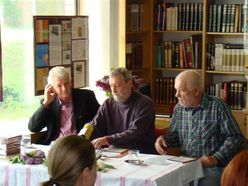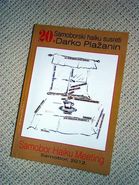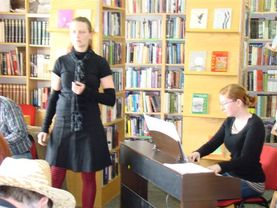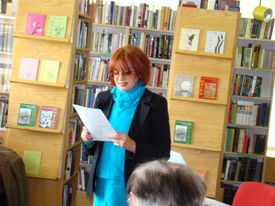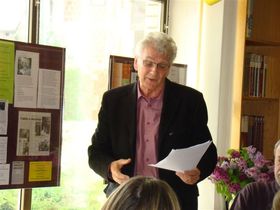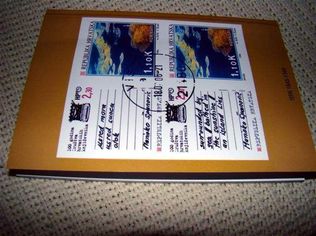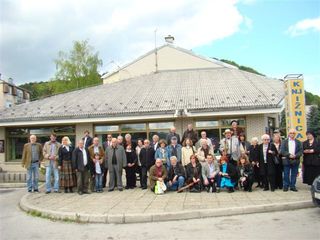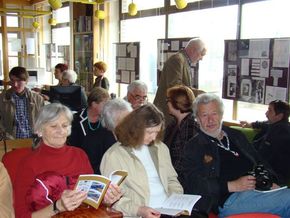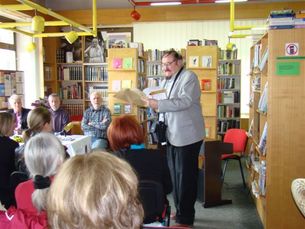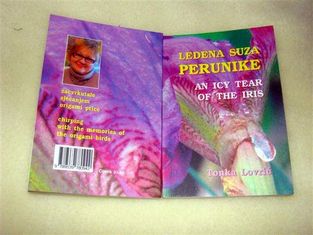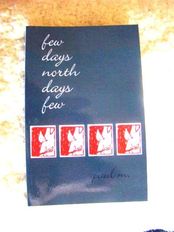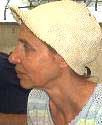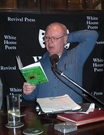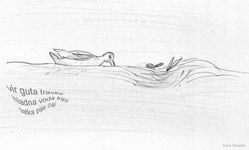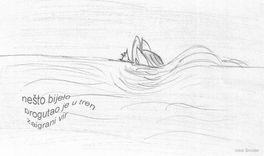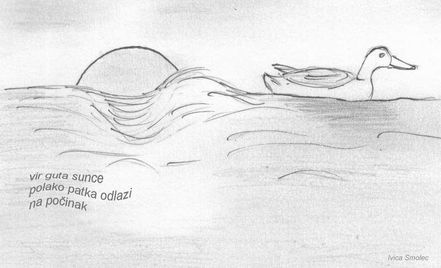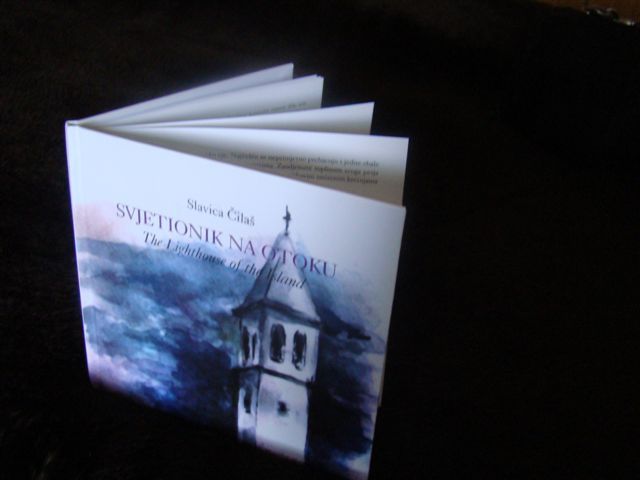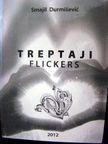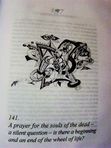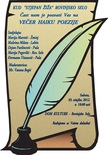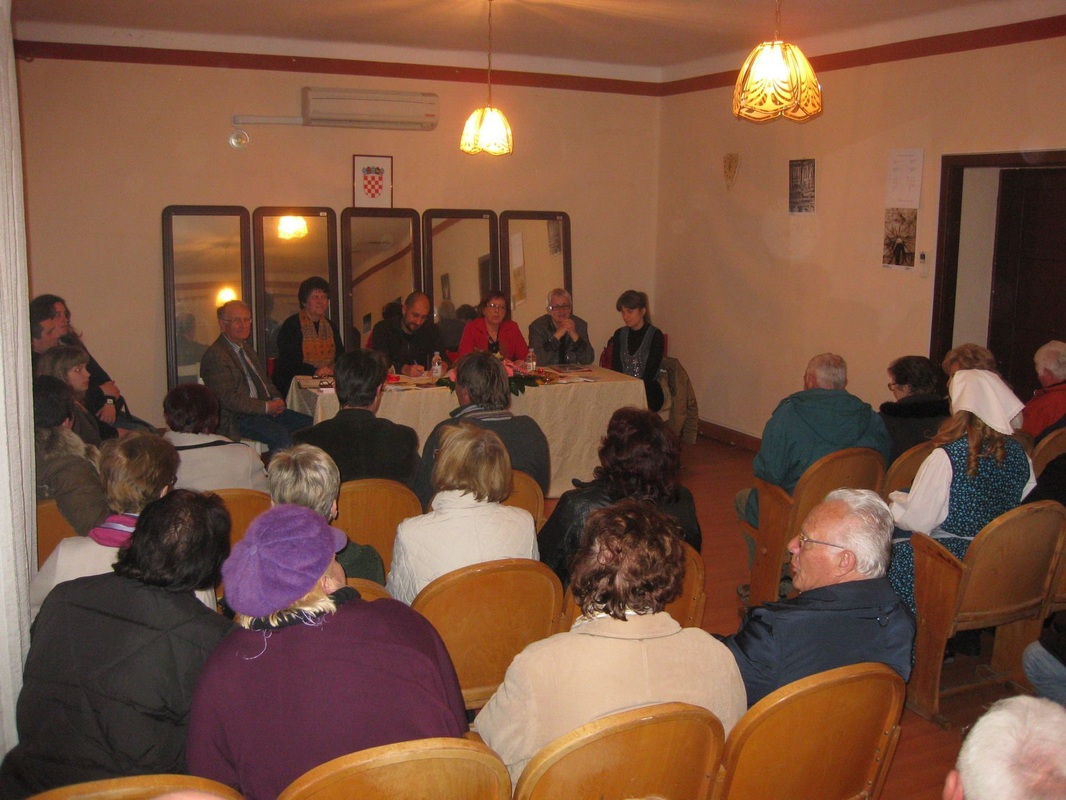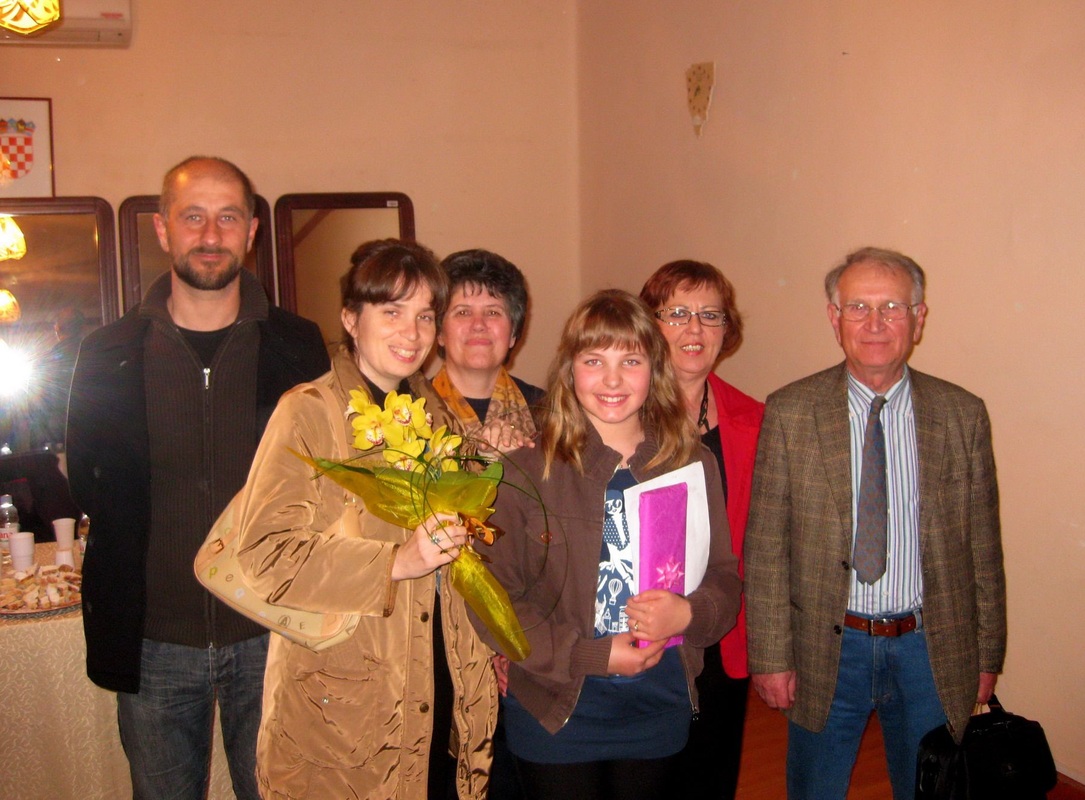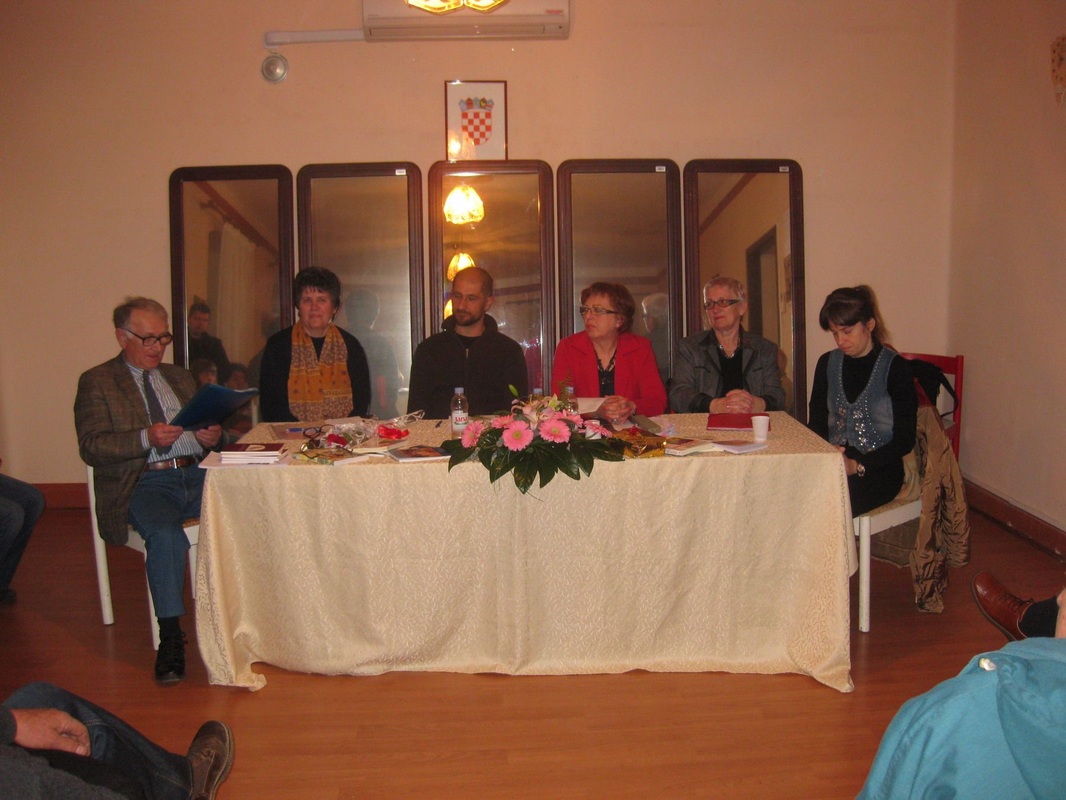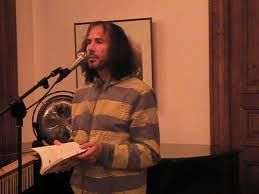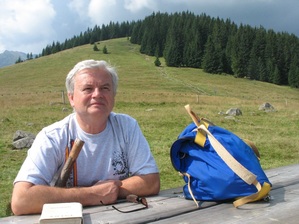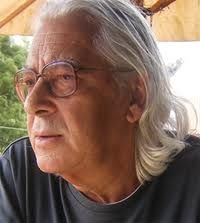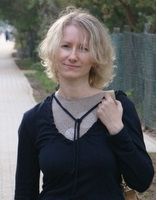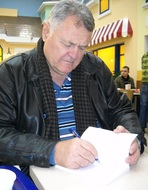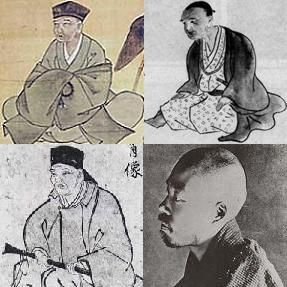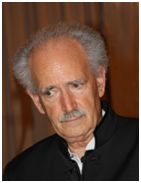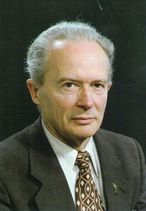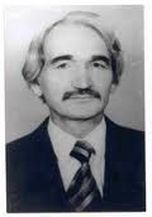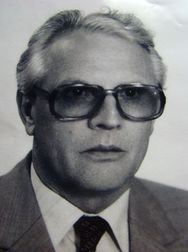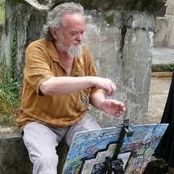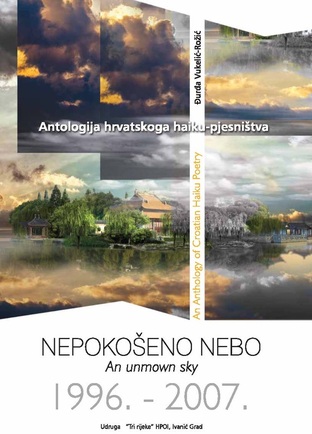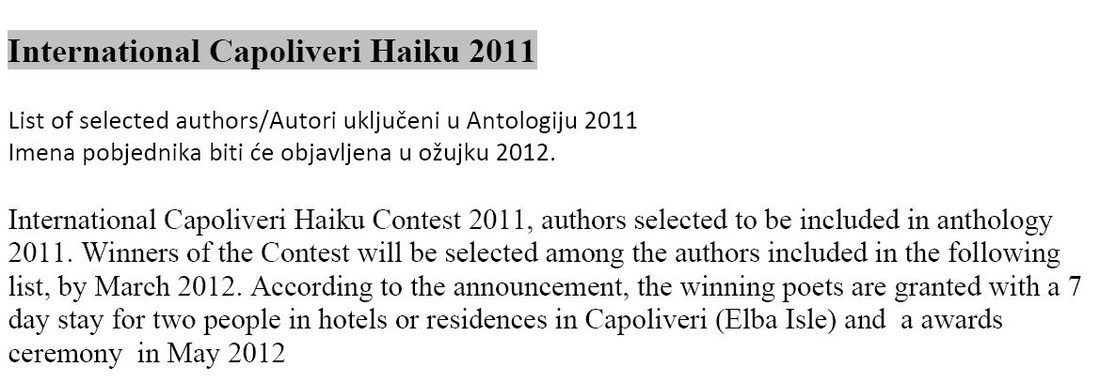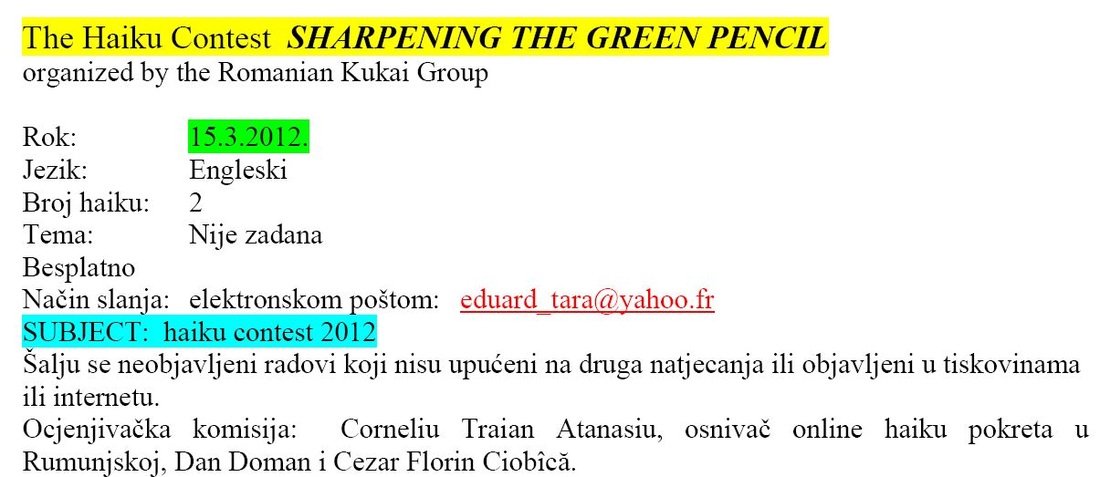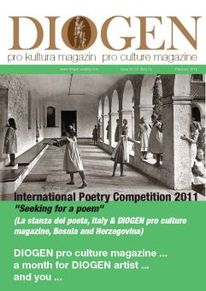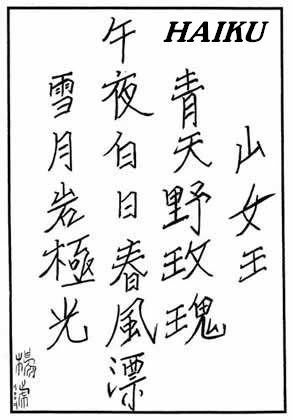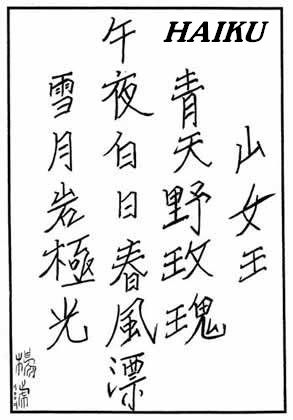|
NA LISTI Od 04.8.2010.g. /
LISTED SINCE August 4th, 2010 among leading European magazines: |
All Rights Reserved
Publisher online and owner: Sabahudin Hadžialić, MSc Sarajevo & Bugojno, Bosnia and Herzegovina MI OBJEDINJUJEMO RAZLIČITOSTI... WE ARE UNIFYING DIVERSITIES |
Narudžba knjiga / Purchasing of the books / Bücher bestellen
DIOGEN pro kultura magazin vam predstavlja...
DIOGEN pro culture magazine presents to you
DIOGEN Haiku PRVI dio/FIRST part (predstavljanja, analize, info /presentations, analyses, info)
Đurđa Vukelić Rožić,
Ivanić Grad Hrvatska DRUGI DIO / SECOND PART...KLIK/CLICK TREĆI DIO / THIRD PART...KLIK/CLICK |
Planet Haiku
Daisetsu Teitaro Suzuki:
„Nema razlike između prosvijetljenog i neprosvijetljenog čovjeka, no samo prosvijetljeni zna da je tomu tako!“ |
1.5.2012.
Osvrt / Review
|
SANJA KNEŽEVIĆ
Tomislav Marijan Bilosnić: Velebit, haiku, Udruga 3000 godina Za dar, Zadar, 2004. U KOLIJEVCI HRVATSKE MITOLOGIJE Tomislav Marijan Bilosnić poput Petra Zoranića hodočasti na Velebit i već u prvome haikuu oni sklapaju zavjet, jer Velebit je hrvatsko svetište: Tulova glava sja s aureolom Prsten Zrmanje. NASTAVAK DOWNLOAD
|
SANJA KNEŽEVIĆ Tomislav Marijan Bilosnić: Velebit, haiku, Udruga 3000 godina Za dar, Zadar, 2004. IN THE CRADLE OF CROATIAN MITHOLOGY Tomislav Marijan Bilosnić goes for a pilgrimage at Velebit, and already in first haiku makes a vow: Velebit is a Croatian temple. Tulova’s peak glows with aureole. The ring of Zrmanja. DOWNLOAD
| ||||||||||||||||||||||||
Natječaji / Konkursi / Competitions
|
THE 16TH MAINICHI HAIKU CONTEST
http://books.mainichi.co.jp/HaikuContest/english.html Rok: August 31,2012 International Section – Engleski ili Francuski jezik Originalni neobjavljeni haiku . Najviše 2 haiku. Besplatno Za slanje e-poštom potrebno je ispunuti obrazac the online entry form na gornjoj Internet adresi. Rezultati će biti proglešeni u Siječnju 2013.g. na the Mainichi Daily News Web site. |
THE 17TH KUSAMAKURA HAIKU CONTEST
http://kusamakura-haiku.jp/boshu/index_e.html Rok/Deadline: September 10th, 2012. (Poštanski pečat) Najviše 2 haiku. Jezik: Engleski Besplatno Rezultati će biti objavljeni sredinom rujna 2012. Nagrade će biti uručene 16.10.2012. u Hotelu Kumamoto Terrsa Radovi se šalju elektronskom poštom ili pismom, a obrazac se može isprintati s web stranice Poštanska adresa: “Kusamakura” Haiku Competition Office c/o Bunka shinko Ka ( Cultural promotion Section ) City of Kumamoto 1-1 Tetorihoncho, Kumamoto City 860-8601 Japan |
NEW BOOK - HAIKU
SOLIDARITY / SOLIDARITATE PRIN
HAIKU / HAIKU
DE RANTAI
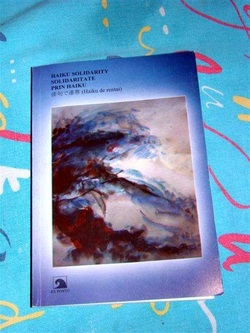
International Haiku-haiga anthology, dedicated to 11th March Fukushima event-Japan;
90 years of diplomatic relationship between Romania and Japan
Anthologist: Aurica Văceanu
ISBN 978-606-598-136.2
(Na 149 stranica, oko 250 autora, među kojima veliki broj učenika osnovnih škola i vrtićke dobi iz nekoliko zemalja.)
90 years of diplomatic relationship between Romania and Japan
Anthologist: Aurica Văceanu
ISBN 978-606-598-136.2
(Na 149 stranica, oko 250 autora, među kojima veliki broj učenika osnovnih škola i vrtićke dobi iz nekoliko zemalja.)
| izbor_choice_new_book.doc | |
| File Size: | 786 kb |
| File Type: | doc |
| izbor_choice_new_book.pdf | |
| File Size: | 167 kb |
| File Type: | |
Haibun putovanja / Haibun travels
|
Dunja Pezelj
RANI AUTOBUS haibun Od trenutka kad zazvoni sat, svaka sekunda je isprogramirana. Ako napravim makar i jedan nepredviđeni korak, ne sluša li me kosa ili ne daj bože, na čarapi pukne očica, kasnim na autobus. U polumraku, da ne razbudim ukućane, kopam po torbi tražeći ključ, misleći pri tom kako je mojoj torbici hitno potrebna jedna dobra inventura...NASTAVAK DOWNLOAD...
|
THE EARLY BUS
From the moment the clock starts to ring, every second is programmed. If I make even one unexpected move, I am late for the bus. In semi-darkness (I do not want to wake up the others) I try to find the keys in my purse, thinking at the same time that it urgently need a good sorting out. Outside, there is a strong southerly wind and rain. My umbrella has instantly become a sail, and soon after a useless rag on a stick. Now I am wet, but completely awake. Pure initiation...NASTAVAK DOWNLOAD...
| ||||||||||||||||||||||||
Naše europsko susjedstvo / Our European neighborhood
Klaus-Dieter Wirth, Germany
|
Alain Kervern, France
| ||||||||||||||||||||||||
Jacek Margolak, Kielce, Poland
|
Olivier Walter, France
| ||||||||||||||||||||||||
Dietmar Tauchner, Austria
|
Sam yada CANNAROZZI, France
| ||||||||||||||||||||||||
Dubravko Korbus
KREACIJA KROZ HAIKU
Ako kažemo da je ljubav ona sila koja pokreće svijet, onda svakako moramo reći i to da je kreacija alat kojim stvaramo sebe i svijet oko nas, što ujedno znači da aktivno sudjelujemo i u stvaranju samog univerzuma. Kreacija je svakako ono najvažnije što radimo u svojem životu. Sve što nas okružuje (a i mi sami ) jest kreacija. Kreacija Boga, prirode ili ljudi...
NASTAVAK...DOWNLOAD
KREACIJA KROZ HAIKU
Ako kažemo da je ljubav ona sila koja pokreće svijet, onda svakako moramo reći i to da je kreacija alat kojim stvaramo sebe i svijet oko nas, što ujedno znači da aktivno sudjelujemo i u stvaranju samog univerzuma. Kreacija je svakako ono najvažnije što radimo u svojem životu. Sve što nas okružuje (a i mi sami ) jest kreacija. Kreacija Boga, prirode ili ljudi...
NASTAVAK...DOWNLOAD
| dubravko_korbus.doc | |
| File Size: | 719 kb |
| File Type: | doc |
| dubravko_korbus.pdf | |
| File Size: | 127 kb |
| File Type: | |
U Samoboru, Hrvatska, održani 20. Samoborski haiku susreti
„Darko Plažanin“
20th Haiku meeting “Darko Plažanin”, Samobor, Croatia
Darko Plažanin (1957-2009.)
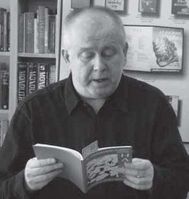
U subotu, 21.4.2012. g., Samobor je bio domaćin dvadesetih, jubilarnih haiku susreta „Darko Plažanin.“ U gradskoj knjižnici
Samobor okupili su se pjesnici iz cijele Hrvatske.
Program su vodili Ivo Markulin i Milan Žegarac Peharnik a u programu su sudjelovali Enes Kišević i Vlasta Mažuranić.
U glazbenom dijelu nastupila je mezzosopranistica Maja Cipek uz klavirsku pratnju Nine Savić.
Prisutni haiku pjesnici čitali su svoje haiku pjesme.
Program su vodili Ivo Markulin i Milan Žegarac Peharnik a u programu su sudjelovali Enes Kišević i Vlasta Mažuranić.
U glazbenom dijelu nastupila je mezzosopranistica Maja Cipek uz klavirsku pratnju Nine Savić.
Prisutni haiku pjesnici čitali su svoje haiku pjesme.
|
Croatian haiku poets met in Samobor, on April 21, 2012.
It was 20th haiku meeting in Samobor, founded by late Darko Plažanin, among Croatia’s foremost haiku poets. The editor, Ivo Markulin, presented a joint collection “Samobor Haiku Meeting, Samobor 2012.” |
Predstavljen je zbornik koji sadrži haiku pjesme 97 autora iz Hrvatske i inozemstva te sjećanja na preminule pjesnike i njihove haiku - Franju Hrga (1933-2011.), Darka Plažanina (1957-2009.) i Marinka Španovića (1955-2011.). Zbornik je otisnut na hrvatskom i engleskom jeziku, uredio ga je Ivo Markulin a ilustrirala Mirjana Žegarac. (Nakladnik: Ogranak Matice hrvatske u Samoboru ISSN 1845-1349; e-mail: info@ogranak-mh-samobor-hr)
|
Izbor haiku/Choice of haiku
|
| ||||||||||||||||||||||||
Izbor haiku/Choice of haiku
|
| ||||||||||||||||||||||||
Izbor haiku/Choice of haiku
|
| ||||||||||||||||||||||||
|
| ||||||||||||||||||||||||
Izbor haiku/Choice of haiku
|
| ||||||||||||||||||||||||
|
| ||||||||||||||||||||||||
|
| ||||||||||||||||||||||||
|
| ||||||||||||||||||||||||
Izbor haiku/Choice of haiku
|
| ||||||||||||||||||||||||
|
| ||||||||||||||||||||||||
|
| ||||||||||||||||||||||||
Izbor haiku/Choice of haiku
|
| ||||||||||||||||||||||||
|
| ||||||||||||||||||||||||
| stjepan_rozic_croatia.doc | |
| File Size: | 731 kb |
| File Type: | doc |
| stjepan_rozic_croatia.pdf | |
| File Size: | 115 kb |
| File Type: | |
15.4.2012.
NOVE KNJIGE / NEW BOOKS
Tonka Lovrić, Split, Croatia
|
Paul Miller, Bristol, Rhode Island, USA
| ||||||||||||
Haiku natječaji / konkursi april / travanj 2012...Haiku competitions April 2012.
|
| ||||||||||||||||||||||||
POZDRAV IZ BELGIJE
|
REGARDS FROM BELGIUM
| ||||||||||||
Our overseas haiku friends / Naši haiku prijatelji "preko bare"
Ferris Gilli, USA
|
Ernesto P. Santiago, Philippines
| ||||||||||||||||||||||||
Aurora Antonović, Canada
| aurora_antonovic_canada.doc | |
| File Size: | 710 kb |
| File Type: | doc |
| aurora_antonovic_canada.pdf | |
| File Size: | 97 kb |
| File Type: | |
INTERVIEW
Interview with AN'YA

ĐVR: A few days ago I received the last number of moonset! Fascinating, how it can be, feeling merriment that it arrived, and then the sadness; it's the very last issue. In his article, The Very Last Word, Peter the Publisher, your husband, writes about it. This changed the way of thinking here in Croatia, at least mine. Coming from a small country, in debts, with such political tabulations throughout centuries, one looks at the USA as a giant, powerful, country where everything is possible. And now, Peter's text. When I lived in the USA, from my lower middle class, immigrant view of a young and healthy person, America was America, indeed, some thirty years ago. It's not the same, is it?
an'ya: No, it is not the same as before ... the USA is still powerful insofar as wealth and education makes almost anything possible here, however, it is sadly changed from what many have perceived it to be in times past. Although I was born on America's West Coast, which was for the most part affluent and quite Americanized, Petar comes from Cleveland (the Industrial manufacturing heartland) that is no more. He watched immigrants from the former Jugoslavia and surrounding East European areas all leave, losing their heritage, occupations, culture, as well as religious and family ties to the USA mechanism.
DOWNLOAD AND READ WHOLE INTERVIEW...
an'ya: No, it is not the same as before ... the USA is still powerful insofar as wealth and education makes almost anything possible here, however, it is sadly changed from what many have perceived it to be in times past. Although I was born on America's West Coast, which was for the most part affluent and quite Americanized, Petar comes from Cleveland (the Industrial manufacturing heartland) that is no more. He watched immigrants from the former Jugoslavia and surrounding East European areas all leave, losing their heritage, occupations, culture, as well as religious and family ties to the USA mechanism.
DOWNLOAD AND READ WHOLE INTERVIEW...
|
| ||||||||||||
My Haiku Bridge to Croatia
By Miki Takamatsu, Tokyo
It was a documentary video which gave me the first information about Croatia.
I have studied education for intercultural and interethnic understanding. As a result I became interested in the war in the former Yugoslavia. Nowadays education for international, multicultural understanding and people living together is becoming more important. But the real world is not as easy as books and teachers suggest. I had learnt about the war in the former Yugoslavia, but only objective information, like the number of deaths, and never portraying the lives of individuals. What did they think about the battles in such a multiethnic place? I wanted to reach out to the people, but I had no idea how to get acquainted with people there at all.
One day a professor lent me a video. “This program will interest you”, he said. He knew I wanted to go to Croatia. It was a TV documentary titled “Haiku”. It was made in 1990, and I found it very moving.
The documentary was about the war in the former Yugoslavia, focusing on “haiku” poets. It introduced a unique haiku anthology “Knots”, and an attempt to rebuild their relations through haiku. It said there used to be a lot of Haiku poets in the former Yugoslavia, and after the war, some became refugees and some became soldiers. It also introduced a poet who was killed. It focused on individuals who belonged to a different ethnic group, and described their life and agony with their haikus. I was surprised to discover that so many people in the former Yugoslavia made haiku with such a sincere attitude. It was not just sincere, but it was honest about their lives. I managed to get the anthology “Knots” from the internet, and then I came to think about going there. I felt that haiku could go beyond borders and ethnicity, and tie people to people individually and directly. I decided to visit Croatia, mainly because I had heard that Croatia is safe and beautiful. And I also wanted to visit the grave in Mostar of a Muslim poet, who was killed during the war.
But it was reckless idea. I tried to get in contact with haiku societies and haiku poets, but I was unsuccessful. I almost gave up the idea to see them in Croatia. At last I sent an email to a Japanese haiku poet, Mr.Banya Natsuishi, and asked him to introduce someone to me. It didn't look very good, because he was a famous poet and I was not acquainted with him. But to my surprise, he replied to me very quickly and suggested to make contact with Djurdja, a Croatian haiku poet. After that, like a rolling stone, everything began to move. Djurdja replied to my email quickly and arranged everything. She did a really incredible job. When I arrived at Zagreb in July 2006, at the old International Hotel in Zagreb, she appeared with Dr. Devidé and his Japanese wife, and her friend Vida, and Višnja – the dead Muslim poet Mirsad’s sister!
It was a special evening. I asked a lot of questions and talked a lot about haiku and their life during the war with them. It was so interesting. I won’t write about the war here, but regarding haiku, the idea of “haiku as mediation” left a deep impression on my mind. After we talked about the war, Djurdja told me “When we connect with different people, we need something like haiku to bond with each other”. Then Vida’s answer to my question “What is haiku for you” was “A communication”. And to my question “What does it mediate with?” she answered: “The world.” I took her words to mean “with nature”, but she said, “Not only nature, everything.” I understood her idea intimately. And I realized that they find a different world in their haiku. It can be a cosmos, it can be a delicate stirring inside and it surely bonds inside and outside, one to the other.
Then early the next morning I left for Mostar with Višnja to visit Mirsad’s grave and see her family. By chance, it was just the day before their family reunion in Mostar! Before we left, she invited me to her apartment in Zagreb. She showed me something which belonged to Mirsad and his “haiga”. They were both really beautiful. I got to know that his “haigas” were a very different type from ours, but I found some sense of haiku and lyricism in his images. She told me about Mirsad, how much he liked haiku and how he had studied Japanese by himself. The next day I went with her to meet her family, and listened to their stories, and what the war had brought them. I and her family visited his grave together. His grave stone was new and white, and we shed tears. It was so sad. Višnja handed me some of his haiku anthologies which were taken from his notes and published by Višnja for her beloved brother. She said “I want to let people know that my brother was here, in this world.” At night I stayed at her Croatian friend’s accommodation in Medjugorje. After I had left them I traveled to other parts of Croatia, and I visited Mostar again. I walked around the reconstructed town, and spent some time seeing the sparkling emerald green river Neretva, where Mirsad used to go fishing.
I visited some other places; Osijek where I had interviews with Ruška, Dubrovnik, Split… I can’t write all of my experiences on the trip here, but if I had to write one memory concerning haiku, I would like to write about Plitvička jezera. Vida took me there. It was more than beautiful; each lake was filled with really blue, crystal clear water. I saw many fish in the shade of summer water flowers. The small cascades were flowing with waving green water plants. When we passed along the path, I smelled an unfamiliar scent. I didn’t know where it came from, but Vida told me, it was cyclamen. Until that time, I hadn’t known “wild cyclamen”. She looked as though she was experiencing nature with her all sense. She was walking slowly, and taking notes for haiku. I was surprised to see that she was doing “ginko” – a stroll specifically suited to help write haiku.
After I returned to Japan, I showed the video and told my stories. Many students said “I didn’t know that there were a lot of haiku poets in the world”, and “I am very glad they like our culture”. “I am proud of Japanese culture”. And they were also surprised to find their “haiku” were very different from those which they had learnt. They had learnt that haiku has rules; 5-7-5 syllables and words of the seasons, and specific particles to express reverberation. They also thought it was almost impossible to make haiku in other languages. “What elements are necessary for haiku?” “Is it still haiku when it is written in a different style and in other languages?” That's open to question. I taught them how haiku developed in our literary histories, and introduced some famous free-style Japanese haikus. I gave them my opinion about haiku, and let them make haikus. Most of them already had experiences to make haikus from their primary and junior high schools. Haiku is very easy to make, so anyone from little children to old people can enjoy haiku, but it is still difficult to make good haikus. Some of them hesitated to try because it is the same as writing short poems. I am not an expert in haiku and I just have general knowledge in the field, but my colleague, Mr.Onizuka who really loves haiku and knows the field very well, assisted me, and we had some nice haiku classes. He showed students some points on how to make good haikus, and we shared our haikus and discussed the expressions in detail. We also selected the best ones and made them better together. Then I gave my students some of Mirsad’s haikus which were translated in English, and we studied those haikus together. For the students who hesitated to make haikus because they didn’t have good ideas or images, it was easier to translate the haikus into their language. But of course it requires a sense of words, and it is a rather creative activity. I intended to enrich their senses of expression. And it is nice to know different ways of expressing the same idea, and in the process to share and select better expressions. They noticed how delicate a haiku can be. I am not sure that this method is a good way to improve their haiku skills, but I enjoyed the class, and I found some of their works were really creative.
I also showed my students a lot of beautiful pictures. In these past couple of years, Croatia has been featured, and is becoming known as a good place to visit. However, many of the students didn’t know very much about Croatia at the time; the videos they had seen were just about the war and the imagery was dark. I wanted to let them know another aspect of Croatia, and the photos of Croatia, Zagreb, Dubrovnik, Split, Plitvice, rural areas, sea, foods, were really appealing to them. I am sure that Croatia is one of the most beautiful countries in the world. I also showed my friends the photos, and all of them were surprised to see them, and they said “They are amazing! I really want to visit Croatia!”
Last year I visited Croatia again with my friend and her daughter. The first time I had no time to enjoy the sights and historical spots, so the second time was just for my vacation. I stayed at a Croatian friend’s house, I met Vida again and I visited the beautiful cities again with my friends. We really enjoyed Croatia as tourists.
It is so far from Japan to Croatia that I can’t visit Croatia often. But I always feel that Croatia is close to me, and I really love the beautiful country and friends I have made there. It is very nice to share feelings through cultures and literature like haikus, and I found that we can share the sense and the delicacy even though we come from different cultures.
One day a beautiful haiku magazine “Iris” was delivered to me. Irises are very familiar to Japanese, and these flowers have been loved and drawn for over a thousand years. I hope the magazine will connect people through their sensitive words.
Miki Takamatsu
By Miki Takamatsu, Tokyo
It was a documentary video which gave me the first information about Croatia.
I have studied education for intercultural and interethnic understanding. As a result I became interested in the war in the former Yugoslavia. Nowadays education for international, multicultural understanding and people living together is becoming more important. But the real world is not as easy as books and teachers suggest. I had learnt about the war in the former Yugoslavia, but only objective information, like the number of deaths, and never portraying the lives of individuals. What did they think about the battles in such a multiethnic place? I wanted to reach out to the people, but I had no idea how to get acquainted with people there at all.
One day a professor lent me a video. “This program will interest you”, he said. He knew I wanted to go to Croatia. It was a TV documentary titled “Haiku”. It was made in 1990, and I found it very moving.
The documentary was about the war in the former Yugoslavia, focusing on “haiku” poets. It introduced a unique haiku anthology “Knots”, and an attempt to rebuild their relations through haiku. It said there used to be a lot of Haiku poets in the former Yugoslavia, and after the war, some became refugees and some became soldiers. It also introduced a poet who was killed. It focused on individuals who belonged to a different ethnic group, and described their life and agony with their haikus. I was surprised to discover that so many people in the former Yugoslavia made haiku with such a sincere attitude. It was not just sincere, but it was honest about their lives. I managed to get the anthology “Knots” from the internet, and then I came to think about going there. I felt that haiku could go beyond borders and ethnicity, and tie people to people individually and directly. I decided to visit Croatia, mainly because I had heard that Croatia is safe and beautiful. And I also wanted to visit the grave in Mostar of a Muslim poet, who was killed during the war.
But it was reckless idea. I tried to get in contact with haiku societies and haiku poets, but I was unsuccessful. I almost gave up the idea to see them in Croatia. At last I sent an email to a Japanese haiku poet, Mr.Banya Natsuishi, and asked him to introduce someone to me. It didn't look very good, because he was a famous poet and I was not acquainted with him. But to my surprise, he replied to me very quickly and suggested to make contact with Djurdja, a Croatian haiku poet. After that, like a rolling stone, everything began to move. Djurdja replied to my email quickly and arranged everything. She did a really incredible job. When I arrived at Zagreb in July 2006, at the old International Hotel in Zagreb, she appeared with Dr. Devidé and his Japanese wife, and her friend Vida, and Višnja – the dead Muslim poet Mirsad’s sister!
It was a special evening. I asked a lot of questions and talked a lot about haiku and their life during the war with them. It was so interesting. I won’t write about the war here, but regarding haiku, the idea of “haiku as mediation” left a deep impression on my mind. After we talked about the war, Djurdja told me “When we connect with different people, we need something like haiku to bond with each other”. Then Vida’s answer to my question “What is haiku for you” was “A communication”. And to my question “What does it mediate with?” she answered: “The world.” I took her words to mean “with nature”, but she said, “Not only nature, everything.” I understood her idea intimately. And I realized that they find a different world in their haiku. It can be a cosmos, it can be a delicate stirring inside and it surely bonds inside and outside, one to the other.
Then early the next morning I left for Mostar with Višnja to visit Mirsad’s grave and see her family. By chance, it was just the day before their family reunion in Mostar! Before we left, she invited me to her apartment in Zagreb. She showed me something which belonged to Mirsad and his “haiga”. They were both really beautiful. I got to know that his “haigas” were a very different type from ours, but I found some sense of haiku and lyricism in his images. She told me about Mirsad, how much he liked haiku and how he had studied Japanese by himself. The next day I went with her to meet her family, and listened to their stories, and what the war had brought them. I and her family visited his grave together. His grave stone was new and white, and we shed tears. It was so sad. Višnja handed me some of his haiku anthologies which were taken from his notes and published by Višnja for her beloved brother. She said “I want to let people know that my brother was here, in this world.” At night I stayed at her Croatian friend’s accommodation in Medjugorje. After I had left them I traveled to other parts of Croatia, and I visited Mostar again. I walked around the reconstructed town, and spent some time seeing the sparkling emerald green river Neretva, where Mirsad used to go fishing.
I visited some other places; Osijek where I had interviews with Ruška, Dubrovnik, Split… I can’t write all of my experiences on the trip here, but if I had to write one memory concerning haiku, I would like to write about Plitvička jezera. Vida took me there. It was more than beautiful; each lake was filled with really blue, crystal clear water. I saw many fish in the shade of summer water flowers. The small cascades were flowing with waving green water plants. When we passed along the path, I smelled an unfamiliar scent. I didn’t know where it came from, but Vida told me, it was cyclamen. Until that time, I hadn’t known “wild cyclamen”. She looked as though she was experiencing nature with her all sense. She was walking slowly, and taking notes for haiku. I was surprised to see that she was doing “ginko” – a stroll specifically suited to help write haiku.
After I returned to Japan, I showed the video and told my stories. Many students said “I didn’t know that there were a lot of haiku poets in the world”, and “I am very glad they like our culture”. “I am proud of Japanese culture”. And they were also surprised to find their “haiku” were very different from those which they had learnt. They had learnt that haiku has rules; 5-7-5 syllables and words of the seasons, and specific particles to express reverberation. They also thought it was almost impossible to make haiku in other languages. “What elements are necessary for haiku?” “Is it still haiku when it is written in a different style and in other languages?” That's open to question. I taught them how haiku developed in our literary histories, and introduced some famous free-style Japanese haikus. I gave them my opinion about haiku, and let them make haikus. Most of them already had experiences to make haikus from their primary and junior high schools. Haiku is very easy to make, so anyone from little children to old people can enjoy haiku, but it is still difficult to make good haikus. Some of them hesitated to try because it is the same as writing short poems. I am not an expert in haiku and I just have general knowledge in the field, but my colleague, Mr.Onizuka who really loves haiku and knows the field very well, assisted me, and we had some nice haiku classes. He showed students some points on how to make good haikus, and we shared our haikus and discussed the expressions in detail. We also selected the best ones and made them better together. Then I gave my students some of Mirsad’s haikus which were translated in English, and we studied those haikus together. For the students who hesitated to make haikus because they didn’t have good ideas or images, it was easier to translate the haikus into their language. But of course it requires a sense of words, and it is a rather creative activity. I intended to enrich their senses of expression. And it is nice to know different ways of expressing the same idea, and in the process to share and select better expressions. They noticed how delicate a haiku can be. I am not sure that this method is a good way to improve their haiku skills, but I enjoyed the class, and I found some of their works were really creative.
I also showed my students a lot of beautiful pictures. In these past couple of years, Croatia has been featured, and is becoming known as a good place to visit. However, many of the students didn’t know very much about Croatia at the time; the videos they had seen were just about the war and the imagery was dark. I wanted to let them know another aspect of Croatia, and the photos of Croatia, Zagreb, Dubrovnik, Split, Plitvice, rural areas, sea, foods, were really appealing to them. I am sure that Croatia is one of the most beautiful countries in the world. I also showed my friends the photos, and all of them were surprised to see them, and they said “They are amazing! I really want to visit Croatia!”
Last year I visited Croatia again with my friend and her daughter. The first time I had no time to enjoy the sights and historical spots, so the second time was just for my vacation. I stayed at a Croatian friend’s house, I met Vida again and I visited the beautiful cities again with my friends. We really enjoyed Croatia as tourists.
It is so far from Japan to Croatia that I can’t visit Croatia often. But I always feel that Croatia is close to me, and I really love the beautiful country and friends I have made there. It is very nice to share feelings through cultures and literature like haikus, and I found that we can share the sense and the delicacy even though we come from different cultures.
One day a beautiful haiku magazine “Iris” was delivered to me. Irises are very familiar to Japanese, and these flowers have been loved and drawn for over a thousand years. I hope the magazine will connect people through their sensitive words.
Miki Takamatsu
Mirsad Denjo (1952-1993)
Mirsad Denjo - Mačak, rodjen je 20.10.1952.g. u Mostaru, a 30.06.1993.g. postao je civilnom žrtvom rata. Tokom svog života bio je haiku pjesnik i slikar a zanimao se i za medicinska svojstva biljaka i lončarstvo. Od 1983.g. objavljivao je poeziju i haiku u književnim časopisima i časopisima za haiku poeziju. Održao je mnoge recitale i sudjelovao u mnogim radio emisijama. (haiku odabrani iz zbirke Vjetar bez sna / Wind with no dream; Hrvatsko haiku društvo, Samobor, 1995. - prijevod Gordana Valand)
Mirsad Denjo - the Tom-cat, was born on October 20th, 1952 in Mostar. He became a civilian victim of war on June 30th, 1993. During his life-time he was a haiku poet and painter; he was interested in medicinal herbs and pottery. He was publishing poetry and haiku in literary magazines since 1983. He gave many recitals and participated in many radio programmes. (haiku reprinted from haiku collection Vjetar bez sna / Wind with no dream; Hrvatsko haiku društvo, Samobor, 1995. - translated by Gordana Valand)
Mirsad Denjo - Mačak, rodjen je 20.10.1952.g. u Mostaru, a 30.06.1993.g. postao je civilnom žrtvom rata. Tokom svog života bio je haiku pjesnik i slikar a zanimao se i za medicinska svojstva biljaka i lončarstvo. Od 1983.g. objavljivao je poeziju i haiku u književnim časopisima i časopisima za haiku poeziju. Održao je mnoge recitale i sudjelovao u mnogim radio emisijama. (haiku odabrani iz zbirke Vjetar bez sna / Wind with no dream; Hrvatsko haiku društvo, Samobor, 1995. - prijevod Gordana Valand)
Mirsad Denjo - the Tom-cat, was born on October 20th, 1952 in Mostar. He became a civilian victim of war on June 30th, 1993. During his life-time he was a haiku poet and painter; he was interested in medicinal herbs and pottery. He was publishing poetry and haiku in literary magazines since 1983. He gave many recitals and participated in many radio programmes. (haiku reprinted from haiku collection Vjetar bez sna / Wind with no dream; Hrvatsko haiku društvo, Samobor, 1995. - translated by Gordana Valand)
Cvijeće u vazi
promatra buru
kako bjesni...
The flowers in the vase
are watching the storm
raging around...
*
Mjesec silazi
niz oštre litice,
sav u Neretvi.
The Moon is descending
down the sharp rocks,
whole in Neretva
*
Seljak na njivi
u žile ljute paprike
ukopava znoj.
A peasant in the field
in the veins of red-pepper
is planting his sweat
*
Posrće, pada
diže se, pada – kozle
na kamenjaru.
Stumbling, falling
getting up, falling - a kid
on the rocky paths.
*
Nabivši Mjesec
na rogove - važan je
jarac na litici.
Impaling the Moon
on his horns – a billy-goat
on a bluff, feels important.
*
Huči Neretva.
Vrbe u prvim resama
šeću obalom.
The roaring of Neretva.
Willows in their first fringes
walking along the river-side.
*
Plove oblaci
utrobom rijeke....
Nepomičan mjesec.
The clouds are sailing
through the river's womb...
The motionless Moon.
1.4.2012.
Primarijus, dr. sci. Ljubomir Radovančević, dr. med, neuropsihijatar i psihoterapeut, supspecijalist socijalne psihijatrije:
POEZIOTERAPIJSKI ASPEKTI HAIKUA
Poezija haiku može se uvrstiti među psihoterapijske metode i koristiti u procesu jedne od njih – poezioterapije. To je dio većega područja biblioterapije, koje se bavi tretmanom duševnih kriza, blažih poremećaja, nervoze, a u cilju rekreacije, relaksacije, re/habilitacije, re/integracije u sklopu vlastite ličnosti, a i u društvo, kod emocionalno nestabilnih ličnosti. Čitanjem beletristike, pa tako sub speciae haikua, mogu se postići pomaci prema poboljšanju psihičkoga stanja i stjecanju mentalne homeostaze. Haiku je forma i sadržaj struktura kojeg može osvježiti, opustiti, razvedriti, ispuniti smislom, humorom, razlozima za povišenje nivoa kvalitete emocionalnoga i intelektualnog života iole sofisticiranoga čovjeka.
Mnogo je toga u haikuu što može pomoći ljudima labilnije psihičke strukture da pronađu svoj mir, odagnaju brige, postignu razumljivo prihvaćanja življenja, otarase se nepotrebnih gubitaka energije u neraspoloženju, žalosti, potištenosti, desperatnosti, tuzi, tjeskobnosti, neshvaćanju racionalne i emocionalne suštine smisla života. Haiku nas opskrbljuje dovoljnom količinom ljepote, usmjerava na prirodne pojavnosti, na smjenu godišnjih doba, smijeh, zdrav način shvaćanja rezultata – posljedica, kao i uzroka, izvora naših nevolja, nelagodnosti, strahova i anksioznosti, disforije i distimije – ponajprije depresije. Haiku je ključ za ovaj dvorac u kome se može naći otklon, zdrav zaborav, susret s estetskom, umjetničkom stranom života, svijeta i bitka.
Poimanje haiku-poante u sklopu je onog AHA-doživljaja koji je imao Sirakužanin Arhimed, grčki matematičar (oko 287 – 212 p.n.e.) kad je ušao u bazen javnoga kupališta, pa vidio koliko je vode isteklo, te tako spoznavši zakkon: količina istisnute vode koju neki objekt potisnut ili djelomično porinut u tekućinu zamjenjuje volumen tekućine koji teži isto toliko kao očigledan gubitak u težini objekta. Bio je toliko oduševljen da je pojurio kući gol vičući: „Heureka! Heureka!“ („Našao sam! Našao sam!”). Taj se fantastični doživljaj ponavlja u tiho svaki put kad shvatimo poantu nekog vica – bljesne nam smisao sadržaja šale. Isto se dagađa u haikuu, jer svaki ima svoju poantu. Doživljaj je oslobađajući, okrepljujući, godi našem nesvjesnom intelektu, jer predstavlja naglo pražnjenje (discharge) pozitivne psihičke energije; slijedi olakšanje, u vicu smijeh, u haikuu racionalna i emocionalna spoznaja. A to je veoma ljekovito. Ali to i nije sve što se koristi u poezioterapiji čitajući haiku i potom diskutirajući s terapeutom. Tako je sama esencija i priroda haikua inventivnost, duhovno-duševna inovacija, anksiolitičko sredstvo, pozitivna emocionalno-intelektualna potreba, što zadovoljava i druge, tercijarne ljudske potrebe: za lijepim, dobrim, ugodnim, šaljivim, očaranim, usklađenim, spiritualnim antidevastirajućim; za nenasiljem, iskrenosti, intelektualnim, poštenjem, objektivnosti, rješavanjem konflikta mirnim sredstvima i mnoštvom drugih vrlina, kreposti i vrednota. Pobrojeni elementi od kojih se kreira i koje pruža haiku nisu samo građevna sredstva, već i sam njegov cilj. Haiku upućuje čovjeka na ljepotu prirode, kao i uz to na zaborav banalnih, trivijalnih kičerskih sitnica koje mu i nehotice kvare kvalitetu življenja:
Gledajući planine/Cio dan se ne sjetih/Staviti šešir.
(Santoka)
Zašto gledati u smeće, kad nam je pred nosom ruža? Haiku upućuje na trenutak – na hic et nunc – ovdje i sada – jedno od glavnih principa gestalt-psihoterapije. Živimo samo sada, prošlost je nestala, budućnost još nije došla.
Bez traga u zraku/ -moj kratki let/što bijaše užitak.
(Rabindranath Tagore)
Svaki haiku ima i dublje značenje koje ulazi sugestivno u nesvjesno područje naše psihe i tamo ne miruje, nego se sedimentira i služi kao vrelo novih zadovoljstava u trenutku potrebe, a i formirajući godinama sve skladniju strukturu osobnosti. Kao što je rekao Onicura:
„Izvan iskrenosti nema haiku-pjesme!“
Ta iskrenost fascinira čitatelja i slušatelja, prodire u njegovo srce i „živce“, uči ga da i on bude tako iskren, otvorena srca, iznoseći ga bez bojazni na dlanu na trg.
U haikuu, kao, ali i više nego u drugoj poeziji, ljudi će potražiti i naći lijeka i zaborava za svoje patnje, boli i boljke, odagnat će negativne misli, tjeskobnosti i depresivnosti. Haiku se nesebično i bezuvjetno nudi svome čitatelju, kao i stvaratelju, kao što se cvijet daje ljepotom boja, skladom forme i mirisom istančanih nijansi, ne tražeći ništa zauzvrat. Haiku nas voli bez ijedne obaveze, kao i ruža, kao štene, mače, janje, i stoga djeluje iscjeljujuće. Haiku liječi povrede, rane i ožiljke na duši, psihotraumatizacije, viktimizacije, deziluzioniranosti, dezidealiziranosti, pesimizam, rezigniranost i tsl. Haiku puni energijom kontejner našega zadovoljstva, razvedrava nas, dok je depresija žderač energije, snage i prozivođač – sinonim – paradigma nezadovoljstva. Haiku ne zavarava, ne pruža „šarenu lažu“, ne vara, ne umata u celofan ovaj svijet, ne prodaje mačka u vreći, ne hohštaplira, ne podvaljuje. Gura čitatelja u realitet, iz kog je duševno poremećen, ili samo malo iščašen, otkačen, luckast ... „skrenuo“. Iz stvarnosti alkoholičar, narkoman, ovisnik druge vrste, depresivan, suicidant, psihotik, bježe poznatim sredstvima, a haiku prevenira u rano doba ove bjegove.
Sliku svijeta haiku nudi neukrašenu, takvu kakva jest, ne hiperdimenzionira, ali niti ne minimizira, reducira. Naravno, budući da je haiku poezija, ni njemu nije strana licentia poetica, i to je u redu kao umjetnički pojam, ali haiku ne prodaje „muda pod bubrege“.
Upravo stoga što nudi genuino, nepatvoreno spiritualno iskustvo, haiku je prihvatljiv u psihokurativnom, terapijskom smislu.
Haiku neprimjetno govori ono što govori, te stoga lakše ulazi u podsvijest svojim laviranim virtualnim subliminalnim porukama. Samo je takva po(r)uka ljekovita, „na mala vrata“, a ne otvoreno nametnuta, eksplicitna, prematurno interpretativna, nego zaodjenuta, zamaskirana, zakamuflirana, na oko enigmatska, ali nesvjesno itekako odgonetljiva. Haiku čovjeka vraća malim stvarima koje jedino jesu bitne. Haiku je heurističan i u smislu efemernosti svijeta i života, entropije, zuba vremena, hrđe, erozije, raspada, korozije, propadanja, putrefakcije, devastacije, dekompozicije, vandalizacije, „puta svega živog“ (the way of all flash).
Lida Lazaj: U RUKAMA HAIKUA
Svatko je sudionik vanjskog odnosa sa svijetom koji ga okružuje, koji vidi, dodiruje, osjeća i koji ostaje u njegovoj memoriji kao dragocjeni preslik i neponovljiva slika. Najveći dio vremena ove jedinstvene izvedbe komunikacije živih bića s prirodom, tako skladne i zbunjujuće, uvjerenje su da život ide dalje, toliko začuđujuće da čovjeka zadivljuju i ostavljaju bez riječi. Ljepota govori kroz umjetnost. Priroda daruje umjetniku mogućnosti i izražajnost, talent. Pjesnik sakuplja u svoj promjercijeli svemir i ima sposobnost prevesti u riječi odsjaj svjetla, žubor vode, zvukove i beskrajne odraze životnoga postojanja.
Balzac je rekao: Poslanje umjetnosti nije kopirati prirodu, nego izraziti je. Moramo razumjeti značenje, duh i način kako stvari i bića izgledaju. Što dolazi poslije toga jesu efekti. Oni su životne slučajnosti, ne život sam.
Ova misija, uzimajući u obzir i druge umjetničke poetske forme, u potpunosti se skladno provodi kroz haiku. Dobar haiku je prekrasan kao ljepota sama, ponekada dolazi uz zasljepljujući sjaj a ponekad skrivena. Stvaranje, stvaralačka umjetnost iscrpljujuća je djelatnost koja dosiže krajnje domete, ali samo poslije takvog iscrpljujućeg rada možete osjetiti zadovoljstvo. S haikuom stvari stoje različito. Stvarati haiku znači da možete ispiti znoj i zadovoljstvo kao koktel, kao samu tu sliku onoliko snažnu u tome trenutku kao što je poruka koju ona nosi. U procesu stvaranja haiku-pjesnik ili pjesnikinja osjećaju se izgubljeno u beskrajnoj mašti i u procesu percepcije, koristeći stvarne i osobne slike i jezik, pokušavajući ući dublje u sadržaj. Baš kao što čovjek obožava svoje vjerske idole, udružujući ruke sa svojim očima izgubljenima u vječnosti, pjesnik haikua kleči na oltaru prirode, Boga, riječnih voda koje ga vode k moru, on ulazi u vlati pune pšeničnoga sjemenja, razgovara s toplim vjetrovima i postaje krilo lastavice koja leti s proljećem, plače s požutjelom travom koja ne želi napustiti ovaj svijet. Njegovo je srce puno prirode, poput golemoga tornada pogađa emocije, prava je oluja razarajućih promjenljivih osjećaja! U japanskome haikuu, koji se sastoji od tri stiha i 17 slogova, pjesnik pokušava prenijeti osjećaj kao što ptica letom donosi boje jeseni. Haiku dolazi s hladnog, ponosnog i buntovnog kontinernta i prema tim pravilima vlastitu inspiraciju ne možemo izraziti bujicom riječi. Stoga pjesnikovo djelo nastaje kao savršen i krasan haiku velikog Milianova:
Kopajući svijet
jarak
postaje moja duša
Treba naći točnu fantastičnu kombinaciju riječi 5-7-5 da bi izvor dosegao najdublje osjećaje duše i zaživio novim i starim jezikom, naizgled jednostavnim, ali koji u sebi sadrži cijeli kolorit, koji poput rijeke vatrostalnoga kamenja, ako ga hrpimice baciš, proizvede prometejski plamen, kao što crna boja skriva sve ostale boje. Tako treba pronaći onu pravu riječ za maleno tijelo haikua, kao što čarobna cipelica Pepeljuge pristaje samo njenom prekrasnom stopalu.
Balzac je rekao: Ljepota je posebna i surova stvar, nije je lako uhvatiti, moraš pronaći način kako je promatrati i nakon što je uhvatiš, čvrsto je moraš zagrliti i zavesti je da bi je osvojio.
Ako uspiješ u svome poslanju da neutraliziraš cijeli svijet u tri haiku-stiha, kao što kiša čini sa suncem, tvoje će djelo sjati poput dijamanta, tri stiha haikua pretvorit će se u balon koji te drži u svojim rukama da možeš vidjeti cijeli svijet, tri haiku-stiha ispunjavaju tvoj prostor ptičjim pjevom i žuborom vode, s tri stiha haikua priroda ti priča svojim jezikom beskrajnih zvukova i boja. A što je realnost ove kombinacije posao-zadovoljstvo? U svojoj sobi, studiju, radnome kutku, u svojoj oazi mira komadići papira puni trostihovlja, poput bijelih lađa što plove mirno sustižući jedna drugu, poništavaju se da bi se stalno poboljšavale na obali inspiracije, pune se miomirisom kao bijeli ljiljani na tvome balkonu i zamirišu tvoj radni stol i svaki kutak sobe. Ili u najboljem scenariju rukohvat haikua. Ne, nemoj misliti da je to poput herbarija s uvenulim cvijećem niti poput leptira probodenih iglom, nimalo! U svojim rukama držiš sitno zadivljujuće biće okruženo paletom boja četiri godišnja doba. Zagrli ga, prođi njegovim stranicama i u trenutku to će postati predstava života, živo biće proljeća. Tu ćeš naći ljepotu, najveću, neponovljivu, nevidljivu rutinu što prolazi tvojim vidokrugom bez kraja. Umjesto poetskog djela destilator proizvodi remek- -djelo, čisti med, što će sasvim sigurno to postati, samo platno tvoga džepa ili škrinja tvoga blaga.
Malo japansko čudotvorje što govori tvojim jezikom zavesti će tvoje srce tolikom ljubavi, osloboditi tvoje čelo sjenki tuge, odvest će te blizu raja božanskoga zvukovlja užarenog ljetnog dana, i do osvježavajućega predaha u začudnom ritmu životne prolaznosti.
Prevela: Iskra Bilosnić Haiku upHaiku upućuje na trenutak – na hic et nunc –HhA
POEZIOTERAPIJSKI ASPEKTI HAIKUA
Poezija haiku može se uvrstiti među psihoterapijske metode i koristiti u procesu jedne od njih – poezioterapije. To je dio većega područja biblioterapije, koje se bavi tretmanom duševnih kriza, blažih poremećaja, nervoze, a u cilju rekreacije, relaksacije, re/habilitacije, re/integracije u sklopu vlastite ličnosti, a i u društvo, kod emocionalno nestabilnih ličnosti. Čitanjem beletristike, pa tako sub speciae haikua, mogu se postići pomaci prema poboljšanju psihičkoga stanja i stjecanju mentalne homeostaze. Haiku je forma i sadržaj struktura kojeg može osvježiti, opustiti, razvedriti, ispuniti smislom, humorom, razlozima za povišenje nivoa kvalitete emocionalnoga i intelektualnog života iole sofisticiranoga čovjeka.
Mnogo je toga u haikuu što može pomoći ljudima labilnije psihičke strukture da pronađu svoj mir, odagnaju brige, postignu razumljivo prihvaćanja življenja, otarase se nepotrebnih gubitaka energije u neraspoloženju, žalosti, potištenosti, desperatnosti, tuzi, tjeskobnosti, neshvaćanju racionalne i emocionalne suštine smisla života. Haiku nas opskrbljuje dovoljnom količinom ljepote, usmjerava na prirodne pojavnosti, na smjenu godišnjih doba, smijeh, zdrav način shvaćanja rezultata – posljedica, kao i uzroka, izvora naših nevolja, nelagodnosti, strahova i anksioznosti, disforije i distimije – ponajprije depresije. Haiku je ključ za ovaj dvorac u kome se može naći otklon, zdrav zaborav, susret s estetskom, umjetničkom stranom života, svijeta i bitka.
Poimanje haiku-poante u sklopu je onog AHA-doživljaja koji je imao Sirakužanin Arhimed, grčki matematičar (oko 287 – 212 p.n.e.) kad je ušao u bazen javnoga kupališta, pa vidio koliko je vode isteklo, te tako spoznavši zakkon: količina istisnute vode koju neki objekt potisnut ili djelomično porinut u tekućinu zamjenjuje volumen tekućine koji teži isto toliko kao očigledan gubitak u težini objekta. Bio je toliko oduševljen da je pojurio kući gol vičući: „Heureka! Heureka!“ („Našao sam! Našao sam!”). Taj se fantastični doživljaj ponavlja u tiho svaki put kad shvatimo poantu nekog vica – bljesne nam smisao sadržaja šale. Isto se dagađa u haikuu, jer svaki ima svoju poantu. Doživljaj je oslobađajući, okrepljujući, godi našem nesvjesnom intelektu, jer predstavlja naglo pražnjenje (discharge) pozitivne psihičke energije; slijedi olakšanje, u vicu smijeh, u haikuu racionalna i emocionalna spoznaja. A to je veoma ljekovito. Ali to i nije sve što se koristi u poezioterapiji čitajući haiku i potom diskutirajući s terapeutom. Tako je sama esencija i priroda haikua inventivnost, duhovno-duševna inovacija, anksiolitičko sredstvo, pozitivna emocionalno-intelektualna potreba, što zadovoljava i druge, tercijarne ljudske potrebe: za lijepim, dobrim, ugodnim, šaljivim, očaranim, usklađenim, spiritualnim antidevastirajućim; za nenasiljem, iskrenosti, intelektualnim, poštenjem, objektivnosti, rješavanjem konflikta mirnim sredstvima i mnoštvom drugih vrlina, kreposti i vrednota. Pobrojeni elementi od kojih se kreira i koje pruža haiku nisu samo građevna sredstva, već i sam njegov cilj. Haiku upućuje čovjeka na ljepotu prirode, kao i uz to na zaborav banalnih, trivijalnih kičerskih sitnica koje mu i nehotice kvare kvalitetu življenja:
Gledajući planine/Cio dan se ne sjetih/Staviti šešir.
(Santoka)
Zašto gledati u smeće, kad nam je pred nosom ruža? Haiku upućuje na trenutak – na hic et nunc – ovdje i sada – jedno od glavnih principa gestalt-psihoterapije. Živimo samo sada, prošlost je nestala, budućnost još nije došla.
Bez traga u zraku/ -moj kratki let/što bijaše užitak.
(Rabindranath Tagore)
Svaki haiku ima i dublje značenje koje ulazi sugestivno u nesvjesno područje naše psihe i tamo ne miruje, nego se sedimentira i služi kao vrelo novih zadovoljstava u trenutku potrebe, a i formirajući godinama sve skladniju strukturu osobnosti. Kao što je rekao Onicura:
„Izvan iskrenosti nema haiku-pjesme!“
Ta iskrenost fascinira čitatelja i slušatelja, prodire u njegovo srce i „živce“, uči ga da i on bude tako iskren, otvorena srca, iznoseći ga bez bojazni na dlanu na trg.
U haikuu, kao, ali i više nego u drugoj poeziji, ljudi će potražiti i naći lijeka i zaborava za svoje patnje, boli i boljke, odagnat će negativne misli, tjeskobnosti i depresivnosti. Haiku se nesebično i bezuvjetno nudi svome čitatelju, kao i stvaratelju, kao što se cvijet daje ljepotom boja, skladom forme i mirisom istančanih nijansi, ne tražeći ništa zauzvrat. Haiku nas voli bez ijedne obaveze, kao i ruža, kao štene, mače, janje, i stoga djeluje iscjeljujuće. Haiku liječi povrede, rane i ožiljke na duši, psihotraumatizacije, viktimizacije, deziluzioniranosti, dezidealiziranosti, pesimizam, rezigniranost i tsl. Haiku puni energijom kontejner našega zadovoljstva, razvedrava nas, dok je depresija žderač energije, snage i prozivođač – sinonim – paradigma nezadovoljstva. Haiku ne zavarava, ne pruža „šarenu lažu“, ne vara, ne umata u celofan ovaj svijet, ne prodaje mačka u vreći, ne hohštaplira, ne podvaljuje. Gura čitatelja u realitet, iz kog je duševno poremećen, ili samo malo iščašen, otkačen, luckast ... „skrenuo“. Iz stvarnosti alkoholičar, narkoman, ovisnik druge vrste, depresivan, suicidant, psihotik, bježe poznatim sredstvima, a haiku prevenira u rano doba ove bjegove.
Sliku svijeta haiku nudi neukrašenu, takvu kakva jest, ne hiperdimenzionira, ali niti ne minimizira, reducira. Naravno, budući da je haiku poezija, ni njemu nije strana licentia poetica, i to je u redu kao umjetnički pojam, ali haiku ne prodaje „muda pod bubrege“.
Upravo stoga što nudi genuino, nepatvoreno spiritualno iskustvo, haiku je prihvatljiv u psihokurativnom, terapijskom smislu.
Haiku neprimjetno govori ono što govori, te stoga lakše ulazi u podsvijest svojim laviranim virtualnim subliminalnim porukama. Samo je takva po(r)uka ljekovita, „na mala vrata“, a ne otvoreno nametnuta, eksplicitna, prematurno interpretativna, nego zaodjenuta, zamaskirana, zakamuflirana, na oko enigmatska, ali nesvjesno itekako odgonetljiva. Haiku čovjeka vraća malim stvarima koje jedino jesu bitne. Haiku je heurističan i u smislu efemernosti svijeta i života, entropije, zuba vremena, hrđe, erozije, raspada, korozije, propadanja, putrefakcije, devastacije, dekompozicije, vandalizacije, „puta svega živog“ (the way of all flash).
Lida Lazaj: U RUKAMA HAIKUA
Svatko je sudionik vanjskog odnosa sa svijetom koji ga okružuje, koji vidi, dodiruje, osjeća i koji ostaje u njegovoj memoriji kao dragocjeni preslik i neponovljiva slika. Najveći dio vremena ove jedinstvene izvedbe komunikacije živih bića s prirodom, tako skladne i zbunjujuće, uvjerenje su da život ide dalje, toliko začuđujuće da čovjeka zadivljuju i ostavljaju bez riječi. Ljepota govori kroz umjetnost. Priroda daruje umjetniku mogućnosti i izražajnost, talent. Pjesnik sakuplja u svoj promjercijeli svemir i ima sposobnost prevesti u riječi odsjaj svjetla, žubor vode, zvukove i beskrajne odraze životnoga postojanja.
Balzac je rekao: Poslanje umjetnosti nije kopirati prirodu, nego izraziti je. Moramo razumjeti značenje, duh i način kako stvari i bića izgledaju. Što dolazi poslije toga jesu efekti. Oni su životne slučajnosti, ne život sam.
Ova misija, uzimajući u obzir i druge umjetničke poetske forme, u potpunosti se skladno provodi kroz haiku. Dobar haiku je prekrasan kao ljepota sama, ponekada dolazi uz zasljepljujući sjaj a ponekad skrivena. Stvaranje, stvaralačka umjetnost iscrpljujuća je djelatnost koja dosiže krajnje domete, ali samo poslije takvog iscrpljujućeg rada možete osjetiti zadovoljstvo. S haikuom stvari stoje različito. Stvarati haiku znači da možete ispiti znoj i zadovoljstvo kao koktel, kao samu tu sliku onoliko snažnu u tome trenutku kao što je poruka koju ona nosi. U procesu stvaranja haiku-pjesnik ili pjesnikinja osjećaju se izgubljeno u beskrajnoj mašti i u procesu percepcije, koristeći stvarne i osobne slike i jezik, pokušavajući ući dublje u sadržaj. Baš kao što čovjek obožava svoje vjerske idole, udružujući ruke sa svojim očima izgubljenima u vječnosti, pjesnik haikua kleči na oltaru prirode, Boga, riječnih voda koje ga vode k moru, on ulazi u vlati pune pšeničnoga sjemenja, razgovara s toplim vjetrovima i postaje krilo lastavice koja leti s proljećem, plače s požutjelom travom koja ne želi napustiti ovaj svijet. Njegovo je srce puno prirode, poput golemoga tornada pogađa emocije, prava je oluja razarajućih promjenljivih osjećaja! U japanskome haikuu, koji se sastoji od tri stiha i 17 slogova, pjesnik pokušava prenijeti osjećaj kao što ptica letom donosi boje jeseni. Haiku dolazi s hladnog, ponosnog i buntovnog kontinernta i prema tim pravilima vlastitu inspiraciju ne možemo izraziti bujicom riječi. Stoga pjesnikovo djelo nastaje kao savršen i krasan haiku velikog Milianova:
Kopajući svijet
jarak
postaje moja duša
Treba naći točnu fantastičnu kombinaciju riječi 5-7-5 da bi izvor dosegao najdublje osjećaje duše i zaživio novim i starim jezikom, naizgled jednostavnim, ali koji u sebi sadrži cijeli kolorit, koji poput rijeke vatrostalnoga kamenja, ako ga hrpimice baciš, proizvede prometejski plamen, kao što crna boja skriva sve ostale boje. Tako treba pronaći onu pravu riječ za maleno tijelo haikua, kao što čarobna cipelica Pepeljuge pristaje samo njenom prekrasnom stopalu.
Balzac je rekao: Ljepota je posebna i surova stvar, nije je lako uhvatiti, moraš pronaći način kako je promatrati i nakon što je uhvatiš, čvrsto je moraš zagrliti i zavesti je da bi je osvojio.
Ako uspiješ u svome poslanju da neutraliziraš cijeli svijet u tri haiku-stiha, kao što kiša čini sa suncem, tvoje će djelo sjati poput dijamanta, tri stiha haikua pretvorit će se u balon koji te drži u svojim rukama da možeš vidjeti cijeli svijet, tri haiku-stiha ispunjavaju tvoj prostor ptičjim pjevom i žuborom vode, s tri stiha haikua priroda ti priča svojim jezikom beskrajnih zvukova i boja. A što je realnost ove kombinacije posao-zadovoljstvo? U svojoj sobi, studiju, radnome kutku, u svojoj oazi mira komadići papira puni trostihovlja, poput bijelih lađa što plove mirno sustižući jedna drugu, poništavaju se da bi se stalno poboljšavale na obali inspiracije, pune se miomirisom kao bijeli ljiljani na tvome balkonu i zamirišu tvoj radni stol i svaki kutak sobe. Ili u najboljem scenariju rukohvat haikua. Ne, nemoj misliti da je to poput herbarija s uvenulim cvijećem niti poput leptira probodenih iglom, nimalo! U svojim rukama držiš sitno zadivljujuće biće okruženo paletom boja četiri godišnja doba. Zagrli ga, prođi njegovim stranicama i u trenutku to će postati predstava života, živo biće proljeća. Tu ćeš naći ljepotu, najveću, neponovljivu, nevidljivu rutinu što prolazi tvojim vidokrugom bez kraja. Umjesto poetskog djela destilator proizvodi remek- -djelo, čisti med, što će sasvim sigurno to postati, samo platno tvoga džepa ili škrinja tvoga blaga.
Malo japansko čudotvorje što govori tvojim jezikom zavesti će tvoje srce tolikom ljubavi, osloboditi tvoje čelo sjenki tuge, odvest će te blizu raja božanskoga zvukovlja užarenog ljetnog dana, i do osvježavajućega predaha u začudnom ritmu životne prolaznosti.
Prevela: Iskra Bilosnić Haiku upHaiku upućuje na trenutak – na hic et nunc –HhA
Lida Lazaj: IN HAIKU ARMS
Anyone is involved in an eternal relationship with the world that surrounds him/her, the world he/she sees, touches, feels, and remains in his/her memory like precious, unrepeatable images. Most of the time, these unique shows of living creatures communicating with Nature, so harmonious and confusing, assuring life goes on, are very astonishing, so the human being is amazed, he/she is speechless. Beauty speaks with artistic words. Nature has giving the artist perceptive and expressive ways, gifts. The poet gathers in his/her diameter the whole universe, and he/she has the capability to translate into words the language of the reflective lights, the roaming of the water, sounds and endless gesture of life evolving.
Balzac said: ”The mission of art is not to copy Nature, but to express it. We need to understand the meaning, the spirit, the way things and creatures look. What comes afterwards, the effects! They are life’s coincidences, not life itself”.
This mission, having too, a good consideration in other arts and poetic forms, is accomplished gracefully by Haiku. A good Haiku is as beautiful as beauty itself, it comes sometimes with a shining brightness or sometimes it is well hidden.
Creative work, creating art is an exhausting activity reaching an extreme deadline, but only after this work can you feel pleasure. Things are different with Haiku. Creating Haiku means that you can drink your sweat and pleasure as a cocktail, as an image itself, at this moment, as strong as the message it brings. In the process of creativity, a haiku poet or poetess, finds himself/herself lost in an endless imagination, perception process, exploring real and gathered images of himself/herself, his/her language. He/she tries to get deeply into the subject. Just like a human worships his/her religious place, joins his/her hands, with his/her eyes lost somewhere in eternity, a haiku poet kneels down at Natures altar, God, river waters takes him/her to the sea, he/she enters the trees with wheat grain, talks to the warm winds, and becomes the arm of a swallow flying with the spring, cries with the yellow grass that do not want to abandon this world. His/her heart is filled by Nature, like a big tornado hits emotions, storm, existing changing feelings. At this moment Japanese Haiku made up of three lines and seventeen syllables raises his hands, he tries to get a feeling, like a bird moving its arms, some of the autumn colors. Haiku comes from a cold, proudly and rebel continent and according to his rules you cannot express your inspiration in a stream of words. And the poet’s beautiful work continues as the perfect and beautiful haiku of the greatest Milianov.
“Digging the world
a ditch
becomes my soul”
It has to be found the proper five-seven-five rookie combination of words, that source, takes shape in the soul’s deepest feelings, in the population’s new and oldest language, maybe it is simple at first sight but holds inside the whole image a set of colors, like the rivers fire stones, if u hit them together they produce Prometheus flames, or the black color hiding all the other colors. It has to be found the proper word for Haiku’s small body, like the golden show of Hirushe, that fits only with her beautiful feet.
Balzac says: ”Beauty is a special and rough thing, it is not easy to catch, you have to find a way, to watch it and after caught you have to hold it tight and oblige it to surrender.”
If you succeed in your mission to neutralize the world in three lines of Haiku, as the rain does with the sun, your work will shine like a diamond, three lines of Haiku will turn into a balloon, holding you in their arms so you can see the world. Three lines of Haiku fills your room with birds and water’s sounds, with three lines of haiku Nature speaks to you with its endless sounds and colorful language.
And the result of this work-pleasure combination?! In your room, studio, or desk corner, in your quite oasis, paper pieces, full of three lines, like white boats floating quietly, hitting each other, they are destroyed and constantly improved in inspiration. They fill with perfume like white lilies your balcony, desk or every corner of your room. Or in the best scenario a set of Haiku. No, do not think that it looks like a herbarium of sick flowers, nor a show of dead, pinhead butterflies. Not at all! You hold in your hands an amazing, little creature, surrounded with fours seasons a set of colors. Hold it in your hands, go through his pages, and he in a spot will turn on into a show, a piece of Spring. You will find there beauty, the greatest, the unrepeatable, the invisible routine that passes endlessly through our eyelashes. Instead in the poet work distillory is produced honey bees, and certainly its going to be ”The lining of your pocket, or the pocket of your bag.”
The little Japanese magician that speaks your language, will allure your heart with so much love, will clean up you from the rite of sorrows, will bring you near to a paradise of white sounds on a hot summer’s day, a relaxing break from the amazing rhythm of life continuing.
Anyone is involved in an eternal relationship with the world that surrounds him/her, the world he/she sees, touches, feels, and remains in his/her memory like precious, unrepeatable images. Most of the time, these unique shows of living creatures communicating with Nature, so harmonious and confusing, assuring life goes on, are very astonishing, so the human being is amazed, he/she is speechless. Beauty speaks with artistic words. Nature has giving the artist perceptive and expressive ways, gifts. The poet gathers in his/her diameter the whole universe, and he/she has the capability to translate into words the language of the reflective lights, the roaming of the water, sounds and endless gesture of life evolving.
Balzac said: ”The mission of art is not to copy Nature, but to express it. We need to understand the meaning, the spirit, the way things and creatures look. What comes afterwards, the effects! They are life’s coincidences, not life itself”.
This mission, having too, a good consideration in other arts and poetic forms, is accomplished gracefully by Haiku. A good Haiku is as beautiful as beauty itself, it comes sometimes with a shining brightness or sometimes it is well hidden.
Creative work, creating art is an exhausting activity reaching an extreme deadline, but only after this work can you feel pleasure. Things are different with Haiku. Creating Haiku means that you can drink your sweat and pleasure as a cocktail, as an image itself, at this moment, as strong as the message it brings. In the process of creativity, a haiku poet or poetess, finds himself/herself lost in an endless imagination, perception process, exploring real and gathered images of himself/herself, his/her language. He/she tries to get deeply into the subject. Just like a human worships his/her religious place, joins his/her hands, with his/her eyes lost somewhere in eternity, a haiku poet kneels down at Natures altar, God, river waters takes him/her to the sea, he/she enters the trees with wheat grain, talks to the warm winds, and becomes the arm of a swallow flying with the spring, cries with the yellow grass that do not want to abandon this world. His/her heart is filled by Nature, like a big tornado hits emotions, storm, existing changing feelings. At this moment Japanese Haiku made up of three lines and seventeen syllables raises his hands, he tries to get a feeling, like a bird moving its arms, some of the autumn colors. Haiku comes from a cold, proudly and rebel continent and according to his rules you cannot express your inspiration in a stream of words. And the poet’s beautiful work continues as the perfect and beautiful haiku of the greatest Milianov.
“Digging the world
a ditch
becomes my soul”
It has to be found the proper five-seven-five rookie combination of words, that source, takes shape in the soul’s deepest feelings, in the population’s new and oldest language, maybe it is simple at first sight but holds inside the whole image a set of colors, like the rivers fire stones, if u hit them together they produce Prometheus flames, or the black color hiding all the other colors. It has to be found the proper word for Haiku’s small body, like the golden show of Hirushe, that fits only with her beautiful feet.
Balzac says: ”Beauty is a special and rough thing, it is not easy to catch, you have to find a way, to watch it and after caught you have to hold it tight and oblige it to surrender.”
If you succeed in your mission to neutralize the world in three lines of Haiku, as the rain does with the sun, your work will shine like a diamond, three lines of Haiku will turn into a balloon, holding you in their arms so you can see the world. Three lines of Haiku fills your room with birds and water’s sounds, with three lines of haiku Nature speaks to you with its endless sounds and colorful language.
And the result of this work-pleasure combination?! In your room, studio, or desk corner, in your quite oasis, paper pieces, full of three lines, like white boats floating quietly, hitting each other, they are destroyed and constantly improved in inspiration. They fill with perfume like white lilies your balcony, desk or every corner of your room. Or in the best scenario a set of Haiku. No, do not think that it looks like a herbarium of sick flowers, nor a show of dead, pinhead butterflies. Not at all! You hold in your hands an amazing, little creature, surrounded with fours seasons a set of colors. Hold it in your hands, go through his pages, and he in a spot will turn on into a show, a piece of Spring. You will find there beauty, the greatest, the unrepeatable, the invisible routine that passes endlessly through our eyelashes. Instead in the poet work distillory is produced honey bees, and certainly its going to be ”The lining of your pocket, or the pocket of your bag.”
The little Japanese magician that speaks your language, will allure your heart with so much love, will clean up you from the rite of sorrows, will bring you near to a paradise of white sounds on a hot summer’s day, a relaxing break from the amazing rhythm of life continuing.
Naše europsko susjedstvo / Our European neighborhood
Ludmila Balabanova, Bulgaria
Vasile Moldovan, Bucharesti, Romania
Aurica Văceanu - Laura, Romania
|
Mike J Gallagher, Ireland
John Parsons, England
Stefano Grotti, Italy
| ||||||||||||||||||||||||||||||||||||||||||||||||||||||||||||||||||||||||
|
Meguro International Haiku Circle
Let's enjoy Haiku in English with us. 2012 March Haiku Meeting: March 10 Moderator: Catherine Urquhart Yuanxiao Festival fireworks, sweet fillings radiant smiles Danyang Feng (China) (Tokyo) wings flapping baby sparrow sporting his voice with a quick vibrato Michiko Murai stone steps shining softly a reminder of spring rain Junko Saeki melting snow- instead of the snowman just a puddle Vasile Moldovan (Romania) i coriandoli - dentro le pozzanghere il carnevale Antonella Filippi (Italy) confetti in the puddles carnival time Antonella Filippi (Italy) Parfum de cires- aduce o speranta printre ruine. Anastasia Dumitru (Romania) cherry fragrance ---- brings hope among the ruins Anastasia Dumitru (Romania) the smell of rain on the tops of the mountains colors of spring Tatjana Debeljacki (Serbia) in my summer house the clock still shows summer time Zoran Mimica (Austria) February 29 -- we get another day out of the soup Robert Scott (Stockholm) cradled by the waves a lifeless form offshore his last fishing trip Royal T. Fruehling (Hawai'i, USA) to visit mother travelling by local bus the only passenger Hanne Hansen (Denmark) old plum tree blooms diligently but just a little Shinya Ogata the earth is not only for human beings -worms awakening Midori Tanaka fresh tree stump with 90 annual rings -what are you thinking? Motoko Satoh slow afternoon subway passengers each to his own Masako Omaki bullfrog dives into the Fossa Magna crash! Ikken Ikemoto an elderly woman struggling on slippery pavements -snowfall in Tokyo Kiyoshi Sugita soft sunlight on plum blossoms dimples on a smiling face Takeo Hanaoka flower viewers happy enough with only a few apricot blossoms Takashi Ikari silent garden full of grieving plum blossoms old man is gone now Midori Suzuki sharply remaining scars of the disaster spring still cold--- Hitoshi Ichinose early spring a ball thrown back into the playground smiling children Masaaki Oka mom’s journey to heaven snow on her red plum blossom Yuzu Sugita purring, rolling on the ground by tombstones cats in love Sachiko Kondo arrow box on his back showered in cherry blossoms Samurai Donald Keene Hideo Ebihara the tsunami-ravaged pine tree once again cradling the spring moon Yasuomi Koganei blown over the fence the neighbour’s cherry blossom lands on my lawn Rado Majkut (Poland) (Tokyo) no plum blossoms yet our typhoon-battered tree on crutches Rado Majkut (Poland) (Tokyo) sounds from the stable thudding on the soil hungry for the morning meadow Juichi Masuda soaking in my bathtub the sunlight dazzling this snowy morning Momo Nishimura a rock-anchored pine pruned by the wind bonsai master Stephen M. Block (USA) http://www.asahi.com/english/haiku/ march 16, 2012 Demolished factory-- this weekend only the crows on new building site D.V.Rozic, Croatia Ivica Smolec: Hajga-niz
vir guta travke a whirlwind swallows the grasses
hladna voda kipi cold water boiling patka pije čaj the duck having tea nešto bijelo something white
progutao je u tren swallowed in a jiff zaigrani vir by a playful whirlwind |
RAZGOVOR/INTERVJU: DARKO PLAŽANIN (1957-2009.)
Prvi puta objavljeno u regionalnom dvotjedniku Otok Ivanić, Kloštar Ivanić 2002.g. ĐVR: Kada je vaš haiku pobijedio na natjecanju u Japanu, o tomu se prilično pisalo kod nas. Mnogi su tada poželjeli upoznati haiku. Tako i ja. Kako ste vi počeli, tko je vama donio haiku? DP: Prije dvadeset i pet godina prvi put sam o haikuu razgovarao s Jadrankom Brnčić. S njom smo tada osnivali književnu grupu Kantili (u spomen na Ljubicu Kantili, veliku ljubav Stanka Vraza) tako da smo razgovarajući o poeziji i književnosti općenito, prvi puta spomenuli i haiku. Jadranka nam je preporučila knjigu Vladimira Devidéa Japanska haiku poezija i tako smo zapravo i počeli u Samoboru. Sjećam se da sam danima odlazio u knjižnicu čitati tu knjigu (kući je nisam mogao dobiti jer je bila jedna od onih knjiga koje se ne izdaju van) po 2-3 sata dnevno i tako mjesecima dok me knjižničarke nisu upoznale - tek tada sam knjigu mogao dobiti kući, gdje sam noćima čitao, učio, upijao, sve dok nisam i sam nabavio knjigu, a knjiga je zaista posebna, kako sadržajem (i danas je redovito listam, čitam), tako i izgledom. U tom početku puno mi je značio i Haiku, časopis iz Varaždina kao izvor haikua. ĐVR: Nagrada za vaš haiku donijela vam je i put u Japan. Kakva su vaša sjećanja? Što se posebno urezalo pa još blista u njima? Kako ste doživjeli Zemlju Izlazećega Sunca? DP: Cijeli je put (Samobor, Zagreb, London, Anchorage, Tokio, Matsuyama - Tokio, Frankfurt, Zagreb, Samobor), kao i boravak u Japanu, nezaboravan: od dočeka na aerodromu, koji su upriličili mlada, lijepa prevoditeljica, ljubazni nosač prtljage i simpatični službeni vozač limuzine, do preuzimanja Gran Prixa, kada sam citirao riječi našeg učitelja Vladimira Devidéa: »Haiku je poljubac pjesme života«. Od viđenoga najviše me se dojmila očuvanost starih dvoraca. U Matsuyami sam bio u dvorcu starom četiri stoljeća, svaki čas sam očekivao da će se pojaviti samuraj iz neke od prostorija potpuno očuvana dvorca i budhističkih odnosno šintoističkih hramova koji sa svojim redovnicima izgledaju kao oaze iz prošlih vremena, okruženi modernim svijetom oko sebe. Posjetio sam i Shikijev muzej u kojemu se može vidjeti gotovo sve iz života jednog od najvećih haiku-pjesnika, a meni je posebno ostala u sjećanju asketska soba u kojoj je živio i radio haiđin Shiki. Imao sam čast upoznati, vjerujem, najveće autoritete haiku-poezije u Japanu: profesore Sono Uchidu i Kazua Sata, a posebno bih istaknuo gostoljubivost, ljubaznost, srdačnost domaćih ljudi kojima sam bio okružen. S pogledom na zalazak sunca u Tihi ocean s terase staroga japanskog restorana uz puno nenapisanih a nezaboravnih trenutaka iz Zemlje Izlazećega Sunca, završavam ovo kratko prisjećanje nagrađenim haikuom: nakon oluje dječak briše nebo sa stolova ĐVR: Osnivač ste Samoborskih susreta. Haiku-pjesnici iz cijele Hrvatske raduju se tim susretima. Kako ste zapravo počeli? DP: Prije deset godina krenuo sam u organizaciju Samoborskih haiku susreta sa željom da se haiku-pjesnici u Hrvatskoj bar jednom godišnje nađu u jednome mjestu, upoznaju, razmijene knjige, ideje, i da se nastavi suradnja tijekom godine. (Izdavač zbornika je Matica hrvatska Samobor, svake godine uvodno predavanje održi prof. Vladimir Devidé a haiku-izložbe postavlja Dragan Vučetić). U organizaciji, odnosno pripremi susreta puno mi pomaže Milan Žegarac-Peharnik. Na susretima smo osnovali Društvo hrvatskih haiku-pjesnika, pokrenuli časopis Haiku, objavili više od tisuću haikua naših ponajboljih haiku-pjesnika ... ĐVR: Što vama znači haiku? Možete li pretopiti u riječi ono što osjećate kada kažete haiku? DP: Mislim da je na to pitanje najbolji odgovor svaki napisani haiku, osobno imam jednu uzrečicu – maksimu koju volim citirati: Makoto no hoka ni haikai nashi, Kamijima Onitsura, u prijevodu: Izvan istinoljubivosti (iskrenosti) nema haiku-poezije (Vladimir Devidé, Japanska haiku poezija) Za mene je haiku prožimanje čovjeka s prirodom, življenje istine kroz ljepotu ljubavi svojom čistoćom. ĐVR: Što mislite o brojnim svjetskim haiku-natjecanjima? DP: Svakako su dobrodošla za popularizaciju haikua, a što ona donosi, najbolji vam je dokaz situacija u našem haikuu. Nikad više haiku-pjesnika i nikad manje haikua. Uz haiku-pozdrav! na tom ledu i sunce se poskliznulo. Darko Plažanin rođen je 30. kolovoza 1957. u Pakracu, živio je u Samoboru gdje je i umro 2009. g. Haiku je pisao tridesetak godina. Na međunarodnom haiku-natječaju u Japanu povodom Dana japanske kulture 1990, osvojio je Grand Prix i put u Japan. Izdao je samostalne zbirke haikua Žubor vode, Svakidašnji put i Samobor. Jedan je od autora zajedničkih zbirki Sedam putova i Sedam novih putova u Zagrebu. Osnivač je zapaženih Samoborskih susreta u sklopu kojih se svakoga proljeća tiska i zbornik haikua. AN INTERVJU: DARKO PLAŽANIN (1957-2009 First time published in regional newspaper Otok Ivanić, Kloštar Ivanić 2002 ĐVR: When your haiku won on a contest in Japan, it was written about it in Croatia, indeed. Many a man wanted to get acquainted with haiku, then. So did I. How did you start to write haiku, who brought this kind of poetry to you? DP: It was with Mrs. Jadranka Brnčić, twenty five years ago, I spoke about haiku for the first time; at that time we were founding a literary group "Kantili" (in memory to Ljubica Kantili, great love of Stanko Vraz) and talking about poetry and literature in general. Jadranka recommended to us a book written by Vladimir Devidé: Japan's Haiku Poetry, and so we started in Samobor. I remember going to read this book at the library for days, because I could not take it home with me (it was one of those books they do not give out), two-three hours a day, and even so over months. After those months the librarians and I got befriended and then it was possible to have taken this book home. I was reading it over nights, studied, absorbed it, until I purchased it myself. This book is very special indeed, with the contents as well as with its appearance. (I read it nowadays, as well). At the beginning, the haiku magazine from Varaždin, Haiku, meant very much to me, indeed, as an source of the haiku. ĐVR: Your prize brought you a trip to Japan, as well. Tell us about your memories, what was very special there, that remained still in your heart? What was your experience of the 'country of the waking Sun'? DP: The whole trip (Samobor – Zagreb – London – Anchorage - Tokyo – Matsuyama – Matsuyama -Tokyo – Frankfurt/M – Zagreb – Samobor) is unforgettable, as well as my stay in Japan; from the arrival and reception at the airport (by a young and beautiful girl translator, kind porter and nice official driver of the limousine) to taking the Grand prix over when I cited our teacher, Vladimir Devidé: 'Haiku is the kiss of the poem of life.' Among the things I've seen, I was the most impressed by preservation of old castles. In Matsuyama, I visited a castle four centuries old, where I expected a samurai to show up from some of the rooms of perfectly preserved castles and Buddhist and Shinto Temples, with their monks, looking as oasis of past times, surrounded with modern world. I visited Shiki's museum as well, wherein you can see almost everything from life of one of the most important haiku poets. It is his asket room, where big haijin Shiki lived and worked, having a special place in my memories. I was honoured to meet, I believe, the biggest authorities on haiku poetry in Japan; prof. Soro Uchidu and prof. Kazuo Sato. I must point out hospitality and heartiness of my hosts. With a view to the setting Sun into the Pacific Ocean from the terrace of old Japanese restaurant, with many unwritten and unforgettable moments from the 'country of the waking Sun', I'm ending this short recollection with the awarded haiku: after the storm a boy wiping the sky from the tables ĐVR: You are the founder of "The Samobor Haiku Meetings". Haiku poets from all over Croatia enjoy coming to Samobor for that occasion. How was it at the start? DP: Ten years ago I started with organization of Samobor's Haiku Meeting, wishing, the Croatian Haiku Poets meet at least once a year in one place, get acquainted, exchange their books, ideas and continue to collaborate all year long. (The collection of haiku Samobor's Meetings is published by Matica hrvatska – Samobor, Dr. Vladimir Devidé holds the introduction speech every year and Mr. Dragan Vučetić sets the exibitions). Mr. Milan Žegarac-Peharnik helps with organization. On the Samobor Haiku Meetings we had founded The Society of Croatian Haiku Poets, started the magazine Haiku, and published over thousand haiku poems by Croatian poets. ĐVR: What does haiku mean to you? Can you put into words your feelings while saying the word 'haiku'? DP: I think the best answer to this question is every written haiku. Personally, I have a saying which I like to cite: 'Makoto no hoka ni haikai nashi, Kamijima Onitusra'. translated: 'Beside the veracity (truthfulness) there is no haiku poetry.' (Vladimir Devidé: Japan's Haiku Poetry). To me, haiku is saturation of a man with the Nature, living of the truth through beauty of love with the serenity/purity. ĐVR: What do you think about numerous haiku competitions in the world? DP: They are welcome for popularization of the haiku poetry, but situation in our haiku is the best example of what it brings. Never we had more haiku poets and never we had less haiku. In haiku greeting, on this ice even the Sun lost its footing. Darko Plažanin was born in Pakrac on August 30, 1957, he had lived in Samobor, where he died in 2009. He had been writing haiku for over thirty years. He had won the Grand Prix and a trip to Japan on The International Haiku Contest in Japan, on the occasion of The Day of Japan's Culture 1990. He had published independent haiku collections Žubor vode (Murmur of the Waters), Svakidašnji put (The Everyday Road), Samobor (Samobor) and was one among the authors in common haiku collections published in Croatian and English Sedam putova (Seven Ways) and Sedam novih putova (Seven New Ways), published in 2003, edited by Duško Matas. He was the founder of successful 'Samobor Haiku Meetings', with an annual bilingual haiku collection. |
vir guta sunce a whirlwind swallows the sun
polako patka odlazi slowly the duck leaves
na počinak for a rest
polako patka odlazi slowly the duck leaves
na počinak for a rest
Call for Submissions:
An Anthology of English-Language Haiku by Women
Deadline: april 15, 2012
Seeking haiku and senryu for an anthology focusing on excellent English-language haiku by women around the world. Ladies, send 5-15 of your best haiku, published or unpublished, to: <[email protected]>. With your submission, please include your name, country, a brief bio of 150 words or less, and any applicable publication credits of submitted poems. Nominations of poets and individual poems are also welcome, and strongly encouraged. Deadline: April 15.
It had come to my attention when searching that there is not anthology of just women's English-language haiku (none that I've found anyway). With such prolific and powerful women writers within the English-language community, they deserve a space/recognition of their own.
http://www.thehaikufoundation.org/forum_sm/index.php?topic=343.0
An Anthology of English-Language Haiku by Women
Deadline: april 15, 2012
Seeking haiku and senryu for an anthology focusing on excellent English-language haiku by women around the world. Ladies, send 5-15 of your best haiku, published or unpublished, to: <[email protected]>. With your submission, please include your name, country, a brief bio of 150 words or less, and any applicable publication credits of submitted poems. Nominations of poets and individual poems are also welcome, and strongly encouraged. Deadline: April 15.
It had come to my attention when searching that there is not anthology of just women's English-language haiku (none that I've found anyway). With such prolific and powerful women writers within the English-language community, they deserve a space/recognition of their own.
http://www.thehaikufoundation.org/forum_sm/index.php?topic=343.0
14.3.2012.
Haiku news / vijesti, 03.3.2012.
HAIKU U ISTRI – photo by Josip Pogorilić
| haiku_u_istri_hrvatska.doc | |
| File Size: | 1184 kb |
| File Type: | doc |
| haiku_u_istri_hrvatska.pdf | |
| File Size: | 140 kb |
| File Type: | |
Naše europsko susjedstvo / Our European neighborhood
Eduard Tara, Romania
Jean Antonini, France:
Toni Piccini, Italy
Petar Tchouchov, Bulgaria
Daniel Gahnertz, Sweden
Krysztof Kokot, Poland
Casimiro de Brito, Portugal
|
Frances Angela. England
Dorota Pyra, Poland
Aleksandar Prokopiev, Macedonia
Georges Friedenkraft, France
Valentin Nicolitov, Romania
Martin Berner, Germany
Erika Novodomska, Czech Republik
| ||||||||||||||||||||||||||||||||||||||||||||||||||||||||||||||||||||||||||||||||||||||||||||||||||||||||||||||||||||||||||||||||||||||||||||||||||||||||||||||||||||||||
HAIKU STARIH JAPANSKIH MAJSTORA
HAIKU BY OLD JAPANESE MASTERS
| kobayashi_issa.doc | |
| File Size: | 2989 kb |
| File Type: | doc |
| kobayashi_issa.pdf | |
| File Size: | 667 kb |
| File Type: | |
In memoriam - Sjetimo se naših haiku prijatelja…
Remembering our haiku pals…
|
| ||||||||||||||||||||||||
|
| ||||||||||||||||||||||||
|
| ||||||||||||||||||||||||
|
| ||||||||||||||||||||||||
| zvonko_petrovic.doc | |
| File Size: | 1313 kb |
| File Type: | doc |
| zvonko_petrovic.pdf | |
| File Size: | 203 kb |
| File Type: | |
Haibun putopis
|
| ||||||||||||||||||||||||
|
| ||||||||||||||||||||||||
BAN’YA NATSUISHI: AN INTERVIEW
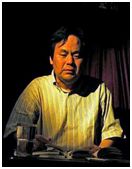
DVR: Here in Croatia, we usually ask haijins how they met haiku, who was their first master. it would be interesting to know how you started to write haiku.
BN: I began to write haiku during my junior high school days. My classmates submitted to monthly magazine for youth, after watching their haiku selected, I began to wrote.
DVR: Is haiku indeed, present in everyday life of Japanese people today?
BN: For some people yes, but no for other people.
DVR. In a certain way, we know how much you work for haiku, but, what has haiku done for you. Did haiku change your life? Can you imagine yourself without haiku in your life, or without such a large engagement being the president of the World Haiku Association?
BN: Haiku had been my passion, but now my mission. After inauguration of WHA, I have been attacked by numerous misunderstandings and jealousies, beyond them haiku is encouraging me to live in this world very confused.
DVR. Daisetsu Teitaro Suzuki (1870 - 1966) traveled around the world, teaching and writing, bringing Japanese culture to the Western world. Carl G. Jung said of him: "Suzuki's works on Zen Buddhism are among the best contributions to the knowledge of living Buddhism. We cannot be sufficiently grateful to the author, first for the fact of his having brought Zen closer to Western understanding, and secondly for the manner in which he has achieved this task". Do you think western haijins have a true understanding of Zen?
BN: I think C. G. Jung is quite wrong about Japan and Zen. Zen is not so deeply connected with true haiku as poetry. So, your question repeats C. G. Jung's fault. Moreover Daisetsu Teitaro Suzuki's remark about Zen is not so clever as you think.
DVR. Culture, religion, politics . they play such a large role in THE development of human beings. Yet, not many of us can walk away into Walden, as Henry David Thoreau (1817 -1862) did, under pressure of civilization's growth and swift changes it brought, then, by the end of 19th century. Is haiku indeed helping modern man under the pressure of constant and swift changes loosing his touch with Nature? If so, can you try to explain how, what satori does to a human being?
BN: Satori is not an aim of haiku writing. Nevertheless haiku writing can brings us a wonderful improvement of author's spirit and soul. I'am often encouraged and purified by nature to write good haiku. I don't accept cliche about "nature" that human being can return into pure nature. Human being is always destroying nature. Such human being belongs to nature, too.
DVR: Was there a moment, in your opinion, in the development of haiku when Western philosophies might have had some influence on haiku? For example, some analysts say, perhaps for the first time, it happened when Shiki worked on the revival of hokku, criticizing Basho's work. What do you think?
BN: It is true that Western culture influenced modern haiku. Shiki Masaoka didn't know well Western culture, after Shiki, some Japanese haiku poets were influenced by German, French and American poetry. Basho was not a Buddhist, he was influenced by Chinese literature (poetry) and philosophy.
DVR: Haiku today, especially after a century of its immigration to the United States, has undergone some changes. Has it changed in Japan as well, after Shiki's reform? Some authors talk about several trends in haiku, we talk about traditional, contemporary, innovative, haiku carrying elements of Zen.. What is haiku? What is your interpretation?
BN: As I said before, Zen is not directly connecte with haiku writing. Haiku writing is quite popular in USA, but not accepted by intelligent people, because haiku writing in USA didn't create clearly haiku poem of high quality. In Japan, almost so-called haiku poets imitate previous haiku, but a few poets are trying writing really new haiku to get more complicated, comprehensive and liberated vision.
DVR: Reginald Horace Blyth, (1898 - 1964) man who left the West and lived and wrote in Japan wrote: "These are some of the characteristics of the state of mind which the creation and appreciation of haiku demand: Selflessness, Loneliness, Grateful Acceptance, Wordlessness, Non-intellectuality, Contradictoriness, Humor, Freedom, Non-morality, Simplicity, Materiality, Love, and Courage". - Haiku, Volume One, p. 154 I suppose, every haijin would agree with at least a part of this statement. Would you give us your own thoughts on it? And please explain how to read this message, how to live it?
BN: R. H. Blyth's remark about haiku is only a moralist's and excessively simplified remark. He learned a little bit Zen and haiku. Blyth brought a misunderstandig about haiku to overseas countries. Blyth could not understand well Japanese language and haiku poetics. Can you understand European poetry, merely based on Christianity without knowing European language? Blyth's fault is such understanding European poetry from only Christian view point withou any languistic and cultural knowledge. Why do you repeat this childish fault of Blyth? I respect Christianity and Zen, but I'm searching for another spiritual horizon.
DVR: About your haiku collection FLYING POPE Bin Akio writes:
"Last year I enjoyed "Flying Pope", a haiku series written by Banya Natsuishi. At first the motif of these works was the irony of existence having absolute status. The next example shows this clearly.
howaito-hausu-e sora tobu houou kage utsusu
To the White House
the shadow cast
by the Flying Pope
However, these are not mere irony. An excellent point of this haiku series is expressing the humanity of the man of power. This is kokkei humor. So in some works, the Pope seems to be Mr.Natsuishi himself.
Kokkei, deep and hidden humor common to Easterners, sometimes is not simple to understand by people from the West. Can you try to help "the rest of the world", in a simple way, to understand the difference between Eastern and Western humor?
BN: Very difficult to explain it in English. Because Western language is a one-lane-road, while Japanese language is a spiral. Humor for me includes deep hate and love, or deep sympathy and criticism at the same time.
DVR: You are a professor at Meiji University , the Publisher and Editor-in-Chief of the haiku quarterly "Ginyu", the Director of World Haiku Association, Editor in chief of the World Haiku Association Anthologies... You travel throughout the world, organize festivals, building haiku bridges among people. All this experience and continual movement among people of different cultures. what would be your message to the world, told in simple sentences, nowadays with the crisis in political, economical and moral fields of life that has become planetary?.
BN: We are always in crisis as well as happiness. People in advanced countries are forgetting spiritual depth, so forgetting the importance of poetry, while poeple in developing countries are living poetry on ordinary days. From another view point, we are in a remarkably crucial peroid for a big and long changing around the world. I cannot say this chaging in a word. We need more mutual understanding beyond cricis often repeated in this century. World-wide Haiku writing is essentially linked with this mutual understanding which the 21st century really needs.
DVR: Some astronauts commented on our Planet as "the boundless Earth" Arts can exist and develop thinking the same way. Haiku has become planetary as well. In how many countries is haiku being written nowadays, and in how many languages?
BN: UnfortunateIy I don't know the exact number, but I guess they are writing haiku in more than 100 countries. Haiku not connected with Zen neither with Christianity can be creative.
DVR. Besides being a bridge between people, can the popularization and mass writing of haiku harm haiku as a serious poetry with such long tradition?
BN: I understand very well your question. I'm always depressed with some superficial haiku writing in any language, while very delighted with haiku poem of high quality which gives me energy to live well.
DVR: Finally, would you be so kind and quote haiku written by an old Japanese master, you seem to like very much and why!
BN: Rough sea--
over Sado Isle
extends the Milky Way
Basho Matsuo
In this haiku, I can find almost everything that human being is involved in.
Hvala!
Biography:
Ban'ya Natsuishi which is the penname of Masayuki Inui, was born in Aioi City, Hyôgo Prefecture, Japan in 1955. He studied at Tokyo University where he received a Masters of Arts in Comparative Literature and Culture in 1981. In 1992 he was appointed Professor at Meiji University where he continues to teach. In 1993 he gave lectures at Jilin University in China, he was invited to haiku meeting in 1994 in Germany, in 1995 in Italy. From 1996 to 1998 a guest research fellow at Paris 7th University. In 1997 he held “Contemporary Haiku” event in Provence. In 1998 with Sayumi Kamakura, he founded international haiku quarterly "Ginyu", became its Publisher and Editor-in-Chief. In 2000, after attendance to Global Haiku Festival in USA, he co-founded the World Haiku Association, in Slovenia. Currently works as the association’s Director. In 2001 attended to Vilenica Poetry Festival in Slovenia, in 2003 to Struga Poetry Evenings in Macedonia, in the same year worked as the Chairman of The Steering Committee for the 2nd World Haiku Association Conference which was held in Japan. In 2004 he was invited to Poetry at Porto Santo in Portugal. In 2005 he attended to the 3rd World Haiku Association Conference in Bulgaria, the 3rd Wellington International Poetry Festival and presided international haiku session of Euro-Japan Poetry Festival in Tokyo. In 2006 he was invited to Poetry Spring in Vilnius of Lithuania and Ohrid P.E.N. Conference in Macedonia. In 2007 he visited Inner Mongolia and promoted haiku writing there and held the 4th World Haiku Association Conference in Tokyo as its Chair. In 2008, after attendance to poetry festivals in Latvia, Estonia, Lithuania & Italy, he held Tokyo Poetry Festival 2008 as its Director. In 2009 after attendance to Lahti International Writers’ Reunion 2009 in Finland, he co-organized Druskininkai Poetic Fall & the 5th World Haiku Association 2009 in Lithuania., with Kornelius Platelis. His attendance to World Haiku Festival Pecs 2010 in Hungary, Haiku-in-Ghent-in-Haiku in Belgium and Sha’ar International Poetry Festival 2010 in Israel scheduled.
Among his awards are: in 1980 he was recommended as Poet of the Year by Haiku-hyôron, in 1981 he won First Prize in a competition sponsored by haiku monthly Haiku-kenkyû, in 1984 the Shii-no-ki Prize, in 1991 the Modern Haiku Association Prize, in 2002 the Hekigodô Kawahigashi Prize of the 21st Century Ehime Haiku Prize, in 2008 AZsacra International Poetry Award for Taj Mahal Review.
Main Japanese publication:
Ryôjô-ki, Seichi-sha, 1983; Poetics of Haiku, Seichi-sha, 1983; Métropolitique, Bokuyô-sha, 1985; Shinkû-ritsu, Shichô-sha, 1986; Dictionary of Keywords for Contemporary Haiku, Rippu-shobô, 1990; The Fugue of Gods, Kôeidô-shoten, 1990; Opera in the Human Body, Shoshi-yamada, 1990; Waves of Joy, Shoshi-yamada, 1992; Poetic Spirit of Genius, Yûshorin, 1993; The Science of Megaliths and Big Trees, Shoshi-yamada, 1995.
Haiku: A Century’s Quest , Kôdansha, 1995 (edited). Contemporary Haiku Manuel, Rippu-shobô, 1996; Haiku Is Our Friend, Kyôiku-shuppan, 1997; Earth Pilgrimage, Rippu-shobô, 1998; Haiku Troubadours 2000, Ginyu Press, 2000 (edited); Collected Haiku Poems by Ban’ya Natsuishi: Crossing Borders, Chûseki-sha, 2001; Chibimaruko-chan’s Haiku Class Room, Shûei-sha, 2002 (edited); A Guide to World Haiku, Chûseki-sha, 2003; World Haiku 2005: No. 1, Nishida-shoten, 2004 (edited); World Haiku 2006: No. 2, Shichigatsudo, 2005 (edited); Right Eye in Twilight, Chûseki-sha, 2006; World Haiku 2007: No. 3, Shichigatsudo, 2007 (edited); Renku: A través do ar / Through the Air/A travers l’air, Shichigatsudo, 2007 (co-authored with Casimiro de Brito); Tenbô Gendai no Shiika Vol. 10, Meiji-shoin, 2007 (co-authored); World Haiku 2008: No. 4, Shichigatsudo, 2008 (edited); Flying Pope: 161 Haiku, Koorosha, 2008; World Haiku 2009: No. 5, Shichigatsudo, 2009 (edited); Nichiyôbi no Zuisô 2008, Nihon-keizai-shinbun-shuppansha, 2009 (co-authored); Labyrinth of Vilnius, Shichigatsudo, 2009; World Haiku 2010: No. 6, Shichigatsudo, 2010 (edited); Haiku Juomujin, Chûseki-sha, 2010 (co-authored with Sayumi Kamakura).
Overseas publication:
Haiku: antichi e moderni, Garzanti Editore, Italy, 1996 (co-authored).
A Future Waterfall: 100 Haiku from the Japanese, Red Moon Press, USA, 1999 & 2004.
Romanje po Zemlji, Društvo Apokalipsa, Slovenia, 2000.
Цветята на Вятьра, Matom, Bulgaria, 2001.
Poesia Sempre NÚMERO 17, Fundação Biblioteca Nacional, Brazil, 2002 (co-authored).
Haiku: Poetry Ancient & Modern, MQP,UK, 2002 (co-authored).
Haiku: the leaves are back on the tree, Greece, 2002(co-authored).
Ombres et Lumières, LCR, Bulgaria, 2003 (co-authored).
Haiku: Poésie anciennes et Modernes, Édition Vega, France, 2003 (co-authored).
Странный Ветер, Иностранка, Russia, 2003 (co-authored).
The Road: world haiku, Ango Boy, Bulgaria, 2004 (co-authored).
Ribnik tišine: slovenska haiku antologija, Društvo Apokalipsa, Slovenia, 2005 (co-authored).
L’Anthologie du Poème Bref, Les Dossiers d’Aquitaine, France, 2005 (co-authored).
Right Eye in Twilight, Wasteland Press, USA, 2006.
ÎMBRĂŢIŞAREA PLANETELOR (THE EMBRACE OF PLANETS), Edidura Făt-Frumos, Romania, 2006.
Endless Helix: Haiku and Short Poems, Cyberwit.net, India, 2007 & 2009.
Le bleu du martin pêcheur: Haïkus, L'iroli, Beauvais, France, 2007 (co-authored).
Madarak /Birds/鳥: 50 Haiku, Balassi Kiadó, Hungary, 2007.
Pellegrinaggio terrestre /Earth Pilgrimage /地球巡礼, Albalibri Editore, Italy, 2007.
Flying Pope: 127 Haiku /空飛ぶ法王 127俳句, Cyberwit.net, India, 2008.
Balsis no mākoņiem /Voices from the Clouds /雲から声, Minerva, Latvia, 2008.
MUNDUS poesie per un'etica del rifiuto, Valtrend Editore Napoli, Italy, 2008 (co-authored).
KONCENTRIČNI KRUGOVI, PUNTA, Niš, Serbia, 2009 (tr. by Dragan J. Ristić).
Music of the Twentieth Century, A.P.F.Publisher, USA, 2010 (co-authored).
| an_interview.doc | |
| File Size: | 1319 kb |
| File Type: | doc |
| an_interview.pdf | |
| File Size: | 281 kb |
| File Type: | |
|
VLADIMIR DEVIDÉ:
DESET PRAVILA KOJIH SE TREBAMO PRIDRŽAVATI PRILIKOM ZAPISIVANJA HAIKU 1. Haiku je trostih gdje stihovi približno imaju redom 5, 7 i 5 slogova. Ukupno, haiku bi redovno trebao imati između 12 i 20 slogova. 2. Haiku često sadrži riječ koja upućuje na godišnje doba u kojem je haiku nastao. 3. Haiku je neposredni izraz pjesnikova doživljaja, pri čemu nije sudjelovalo razmišljanje, zaključivanje, poučavanje i slično. 4. Haiku pjesnik uranja u predmet svoje pjesme i ne ističe svoje «ja». 5. Tema haiku pjesme najčešće je priroda i čovjek u njoj. Ljubav u značenju erosa općenito nije predmet haiku. 6. Da bi neki doživljaj bio zabilježen kao haiku, mora imati i svoje poetsku vrijednost kojom se izdiže iznad bilo kakvog doživljaja bez posebnog značenja. 7. Ljepota haiku je u njegovoj istinskosti, neposrednosti i posebno u tome što je njime nešto možda već otprije poznato doživljeno na novi način – čišće, snažnije, dublje. 8. Vrijeme u kojem se haiku događa je gotovo beziznimno sadašnjost – haiku je poezija «ovdje i sada». 9. Haiku nije aforizam, nije poslovica, nije minijatura – nije «pjesmičak». Haiku ne smije biti kićen. Haiku ne trpi sroka, jer je taj za nj prejako sredstvo koje bi mu prigušilo tankoćutnije nijanse. U pravilu, haiku nema naslov. 10. Ako želite pisati haiku, pročitajte i doživite što više haiku pjesama istaknutih haiku pjesnika. PHILL MADDEN:
WHAT IS THE CORRECT DOSAGE OF HAIKU? I don’t ask as someone who has any scholarly expertise –just as someone who loves wriTing, reading, hearing and “seeing “them. How do we judge an individual haiku, now that the form has, thankfully, become so much freer? Criteria might include -an exact brevity -a start!stop sense of wonder -a feeling of delicious surprise -a perfection and tension of paradox -a sense of the infinity of space in any one moment. Can all this get lost when there are many haiku together? Incidentally, what is the correct term for a collection of haiku-an amazement, a reverie, a wryness? What happens when we experience many haiku at once? Is the experience diminished-like gorging on After Eight? Or is the experience simply different, or indeed enhanced-the repetition producing a lulled heightening of awareness? And what is the function of an individual haiku in a sequence or collection? Is each individual haiku like an episode of The Archers- authentic, recognizable, different but reassuringly similar whenever we switch on and off. Perhaps it is similar to a jazz or classical concert- the mind inevitably wandering, but wandering within, and whenever we come back there is still excellence, unfolding. For me the answer is “and “ not “or”. Maybe haiku, like all art, Is an organic algorhitm narrowing down to the openness of whatever we want it to be. PHILL MADDEN: KOJA DOZA
HAIKUA JE ISPRAVNA? Ne pitam se to kao netko tko je akademski stručnjak – tek kao osoba koja voli pisati, čitati, slušati i promatrati ih. Kako procjenjujemo pojedinačni haiku, sada kada je forma postala toliko slobodnija? Kriteriji mogu uključiti: - sažetost - start/stop osjećaj začudnosti - osjećaj vrsnog iznenađenja - savršenstvo i napetost paradoksa - osjećaj beskonačnosti i beskrajnosti svemira u jednom jedinom trenutku Može li se ovo izgubiti kada je mnogo haiku zajedno? Sporedno, što je točan naziv za zbirku haiku – zapanjenost, sanjarenje, duhovitost s aromom ironije. Što se događa kada doživljavamo mnogo haiku odjednom? Je li to iskustvo umanjeno – kao prejedanje slatkišima “After Eight?” Ili je to jednostavno drugačije iskustvo. Da li pretjerano ponavljanje stvara kraći period mirnoće naglašavajući svjesnost? Koja je zapravo svrha pojedinačnog haiku u nizu ili zbirci? Je li svaki zasebni haiku kao jedna epizoda najdulje sapunice na svijetu, “The Archer?”** Je li svaki zasebni haiku kao jedna epizoda ove sapunice – autentičan. prepoznatljiv, drugačiji ali uvjeravajuće slični kadgod se uključimo ili isključimo. Možda liči koncertu jazza ili klasične glazbe – gdje um neizbježno luta, ali skitajući u okviruima onoga što slušamo, te kad god se vratimo ta razvijena izvrsnost je pristuna i nadalje postoji. Za mene odgovor je - i, ne, ili. Možda je haiku, kao i sva umjetnost organski algoritam što se sužava ka otvorenosti onoga što želimo biti. *After Eight – popularni slatkiš od mente preliven gorkom čokoladom ** The Archers – britanska sapunica, emitira se na BBC Radio 4 s više od šesnaest tisuća nastavaka TONČI PETRASOV MAROVIĆ:
OPASKE O HAIKU Haiku je prije svega postupak i odnos negoli pjesma. Haiku je način postupanja: sa svijetom-jezikom. Krivo imaju oni koji drže da je haiku tek lirska sličica, igra smislom i slovima. Haiku je skuplji od toga: on je način gledanja, način uzimanja svega u obzir: u-vid; u pjev. A nipošto ne o-opje(anje). Same srži svijeta ulaze i staju u pjev haiku; a što su pjesnicima srži svijeta akoli ne njegove sjenovite pojave. Čak i današnja moda haiku ima veze s njegovom magičnošću, s njegovim odgovaranjem Vremenu. Magično u haiku jest njegova bogovska zbijenost, zbiće najnužnijega govora, koji je tek načeta Šutnja, istom i jedva odvrnuta plahta onog hamletovskog Ostalog s bolesne postelje Svemira, neki bi rekli, Bitka. Stavljanje toga ostalog u tu nemoguću kratkoću, koja je pjev i prihvaćanje, istina i slavljenje - jest duh haiku. Pisati haiku (a time mislim: pravi i pravilni haiku: 5,7,5 ili vrlo blizu toj mjeri) najteža je vrst pjesničkoga posla koji znam. Tim teža što se, držim, istinski haiku ne smije pisati ni u japanskoj ni u bilo kojoj drugoj tradiciji; da bi bio istinski i da bi bio daljnja vrijednost, poticajna tradicija - mora biti izvoran. U istinskom ili, dajbože, velikom haiku sve je dopušteno, pa i da bude nepravilan. Glasoviti Bashôov haiku o gavranu, uostalom, napisan je s 19 umjesto 17 slogova, no ni danas ne osjećamo da je zbog toga manje savršen. Svak može pisati haiku jer pisati haiku uopće nije teško. Teško je, štoviše, rekao bih, nemoguće je napisati dobar haiku. Treba izabrati: živjeti; najprije točne riječi za nj, a zatim i njega, haiku. Zapravo one najbolje, koji vazda nisu ni izdaleka onakvi kakvi bi trebali biti; kakav bi trebao biti naš život. Valja živjeti haiku. Utekao sam se haiku, kao najvišoj šutnji i prvom govoru, kad nisam ni na koji drugi način mogao dalje. otad, a to znači od 1960/61. do danas, u samu susjedstvu sa smrti, ja se utjecah haiku, uzimljući utjehu od njega. Nikad neću zaboraviti trenutak prije moje druge operacije, kad sam imao sreću naići na ovaj Issin haiku: O, pužu, popni se uz planinu Fuji, ali polako, polako ... Bijah utješen do uvjerljivosti da će sve biti dobro. Taj mi je 'mali' haiku ulio više snage i uzdanja negoli cijela Salingerova knjiga 'Franni i Zooey' u kojoj sam ga našao; negoli mnoge druge koje sam tada pokušavao pročitati. Gotovo mi se čini da bih smio reči da haiku nije za svakoga i u svako vrijeme. Haiku je za one rubne: ljude, situacije, trenutke. Valja imati veliku, pravu potrebu za nesuvišnim govorom pa da se napiše dobar haiku. Valja imati jedinstven ukus (izbor) i skup život. Haiku je strog i skup pjev. Nema toga nakita s kojim bismo ga smjeli usporediti. Haiku nije nakit. On je kao pogled u koji vas svijet stane i da se ni načas ne umisli da je svijet sâm. Haiku je kao oko: ako vidi, vidi se. Jer njime i mi vidimo i uvidimo. Vjerujem u haiku, tj. sumnjam u njega, dakle vjerujem: i vraćam mu se. On izriče uvid i osjećanje čovjeka koji ne brine o kosi kad mu se o glavi radi ( akomu se to o glavi ne radi!); on vraća svetu besjedu Stvari bez suvišnosti. Vjerujem u haiku, u njegovu skupu strogost, mudru nemogućnost. Kao što vjerujem u materisnki muk i jezik kojim pišem, i poeziju koji bih želio da ja ili netko drugi napiše. Pravi je haiku pravo-rijek na strani ispravna življenja i neponovljiva pjevanja. Mnogi će se spotaknuti o kamen haiku; rijetki će ga ponijeti za uzglavlje. Iz časopisa Haiku broj 3. Varaždin, jesen 1977. 14. Haiku dan - Dubravko Ivančan, Krapina 2012
Natječaj za haiku Rok: 2.4.2012. Jezik: Hrvatski književni jezik – 3 haiku Kajkavsko narječje – 3 haiku Tema: Nije zadana Besplatno Šalju se neobjavljeni radovi koji nisu upućeni na druga natjecanja ili objavljeni u tiskovinama ili internetu. Radovi se šalju isključivo šifrirano i poštom. U kuverti s radovima pošaljite zapečaćenu kuvertu sa svojim podacima Adresa: Pučko otvoreno učilište Krapina P.P. 40 49000 Krapina Osoba za kontakt: Ksenija Cerovečki 049/370-561 http://www.krapina.net/html/start.asp |
United Nations Office for Disarmament Affairs
Poetry for Peace contest http://www.un.org/disarmament/special/poetryforpeace/ Choice fromt contest entries / Izbor haiku s natječaja Zlata Bogović, Varaždin, Croatia The mushroom cloud sowing death and fear. Sad memories. Oblak u obliku gljive sijao je smrt i strah. Tužna sjećanja. * Clouds cleared - Nagasaki a tombless graveyard Raščistili se oblaci – Nagasaki- groblje bez groba Tatjana Debeljački, Serbia Night light of a bomb You saw the past of Japan Burdened with graveyards * You are all these things A forest stream a warm night Japan's history Smajil Durmišević, BiH for a piteous wage they poison our children- yet, we don't care * an infant born with two heads —a miracle? no, there’s poison everywhere! Dubravko Korbus, Croatia one life, two recognitions tree in a winter night cherry is full of blossoms Duško Matas, Croatia after the blast raising mushroom of the smoke - havoc in Hiroshima * an anniversary -- gong of the Peace Bell memory of a dying city Malvina Mileta, Croatia a moment of silence on the deathbed Nagasaki's morning trenutak tišine na samrtnoj postelji - jutro u Nagasakiju * Hiroshima's woe each stone and a flower with a stamp of enemy tuga Hirošime svaki kamen i cvijet nosi pečat neprijatelja Ljudmila Milena Mršić, Croatia a falling monster -- man sowing A-bombs harvests death čudovište padnu – sijući A-bombe čovjek žanje smrt * Hiroshima on that August a tomb above earth Hirošima toga kolovoškog dana grobnica nad zemljom Marija Anđela Pogorilić, Croatia sound of the plane above the clouds screams under the ruins zvuk aviona iznad oblaka jauci pod ruševinama * Hiroshima children’s' games stopped by the airplane Hirošima dječju igru prekinuo avion Stjepan Rožić, Croatia nuclear weapons -- the roots of evil seed sprouting over the Planet nuklearno oružje – korijenje zlog sjemena niče diljem Planeta * Planet Earth, the crib of mankind dead and bald? Planet Zemlja, kolijevka čovječanstva mrtva i ćelava? Željka Vučinić Jambrešić, Croatia a destroyed city in a tear of a small child submerged moon * August bombing the sound of the blast even today Đurđa Vukelić Rožić, Croatia sunny August day man and his dog died together sunčani kolovoški dan čovjek i njegov pas umrlli zajedno * burnt both wings of dragonfly and man that August '45 day izgorjela krila vilin konjicu i čovjeku kolovoza '45 |
TONČI PETRASOV MAROVIĆ:
SOME OBSERVATIONS ON HAIKU
Before all, haiku is a proceeding and relationship but the poem.
Haiku is a mode of procedure: the world-the language
Wrong are those trusting haiku being a little lyrical picture, a game with the meaning and the letters.
Haiku is more expensive than that: he is a way of seeing, way of taking into consideration: inner look; in-composing. It is not praising in poem.
Haiku holds the very quintessence of the world; and what should the pith and marrow of the world be to the poets if not its shadowy appearances.
Even today's popularization of haiku has the ties to his magic, his replying to the Time.
Magic in haiku is his godlike compactness, congestion of the most necessary speech, which is only a broached Silence, a sheet hardly turned off that Hamlet like Remaining from the sick bed of the Space, some might say, the Being itself.
Putting all this remaining in this impossible shortness, which is singing and accepting, the truth and celebration – is the spirit of haiku.
To write haiku (by this I think of classical haiku of 5-7-5 syllables or very close to this measure) is the most difficult kind of the poet's work that I know of. Even harder since, I suppose, a true haiku must not be written in a Japanese or any other tradition; in order for him to be genuine and bear further true merit, incentive tradition – it must be original.
In true or, grant God, great haiku everything is permitted, even his irregularity. Well know haiku by Bashô about the raven, after all, has been written in 19 instead of 17 syllables, but even today we don’t feel he is less perfect because of this.
Everybody can write haiku, because it is not difficult to write haiku, at all. It is difficult, I'd say, almost impossible to write a good haiku. One should choose: to live; at first exact words for him and then, haiku himself. As a matter of fact, the best, which are not always the way they should be, the way our life should be.
One should live the haiku life.
I took refuge in haiku, as the highest silence and the first speech, when I knew not the other ways to go on. Since then, and that means since 1960/61 till today, in the neighbourhood with death, I kept running away to haiku, taking his solace.
I will not forget the moments before my second surgery, when I was lucky to ran into Issa's haiku:
Oh, you snail,
Climb up the Fuji mountain
But slowly, slowly
I was consolidated to conviction that everything will end fine for me.
This 'little' haiku infused more strength and trust to me than whole Salinger's book Franni and Zooey in which I found him, more that many other books I tried to read at that time.
It appears to me I should be free to say that haiku is not for everyone and at every time. Haiku is for those on the margin: people, situations, moments. One should have a big, real need for unsuccessful speech in order to write a good haiku. Haiku poet should have a unique choice and an expensive life.
Haiku is rigid and expensive poem.
There is no adornment we might compare him with.
Haiku is not ornament.
He is like a gaze in which the whole world may be held without having a single thought for a moment, him being the world itself.
Haiku is like an eye: if it sees, it is seen. We, too see and become aware of.
I believe in haiku, I have doubts about it, thus I believe: and return to him.
He keeps on saying a look and feelings of man worrying about his hair while his life is at stake (and whose life is not at stake!); haiku returns a holy utterance of the Things without the superfluity.
I believe in haiku, in his expansive severity and wise impartibility. As I believe into mother's silence and the language I write in, and poetry which I wish, I myself or somebody else would write down.
A true haiku is a verdict on the side of truthful living and unrepeatable poetry.
Many will stumble over the stone called haiku; rare will take for the pillow.
From magazine Haiku No. 3, Varaždin, Autumn 1977.
Prevela/Translated by Đ.V.Rožić
FRANJO HRG:
MOŽE (LI) I BEZ ZENA (?)
Slažem se s vama, poštovani čitatelji, da je naslov – u najmanju ruku – neobičan, i jezički, a za one između vas koji (možda) pišete stihove in modo Japonico zacijelo još i više zbog izražene dvojbe i/ili tvrdnje o onome što se obično, makar i teoretski, pretpostavlja (pa i traži) u trostisima naširoko poznatima pod nazivom haiku.
Zašto je naslov ovoga teksta takav, razloga ima nekoliko. Jedan je od njih i u tome što se u hrvatskoj, a i ne samo hrvatskoj teoriji o haikuu, a još više u pisanju takvih pjesama (kojima ja obično pohrvaćujem naziv u hajkići, odnosno, ako su na kajkavskome, hajkiči), zanemaruju mnoga od napisanih i nenapisanih pravila za njihovo pisanje. To se dobrim dijelom odnosi na njihovu formu s brojem od 5-7-5 slogova u stihovima, ali umnogome i na njihovu, rekao bih, unutarnjost.
U prvome slučaju nerijetko se radi samo o autorskoj nebrižljivosti, ponekad i (ne)znanju hrvatskoga jezika, odnosno kojega od njegovih narječja kojim se piše. Neki kao da zaboravljaju da pridjevi u određenu liku mogu u nekim padežima imati i kraći i duži oblik, npr. jutarnjeg/jutarnjega, lijepom/lijepomu/lijepome i dr. Slično se mogu ponašati i neki prilozi, npr. kad/kada i dr. Neke pak zamjenice, osim toga, mogu biti duže i kraće i na taj i na drugi način, već i u osnovi, npr. mojeg/mojegamog/moga i dr. A kad netko napiše Navek bu kaj bil kaj, pa mu čak ciklus (haiku) pjesama s tim stihom bude na kajkavskom pjesničkom recitalu i nagrađen, onda je to kajkavcima (najblaže rečeno) smiješno, jer njima taj stih ne znači da će kaj biti kaj, nego da će ga - tući. Samo - tko ili što koga ili što?!? Naime kaj, kajkavski se budućnost doduše izriče oblicima tzv. futura II, ali i prezentskima, a isključivo su takvi u kajkavskoga glagola biti kada ne znači tući, nego isto što i latinski esse ili engleski to be.
Što se pak, da tako kažem, unutarnje forme tiče, ako Kyoshi (Kjoši) i kaže
Jesenski vjetar –
sve stvari koje opažam:
sve je haiku.*
to njegovo sve ne odnosi se baš na - sve. Na vidljivo, opažajno - zacijelo, ali na nevidljivo, pretpostavljeno, pomišljeno, izmaštano, isfilozofirano, humoristično i sl. - valjda ipak ne. Ponešto od čega takvoga možda bi još i moglo ući u drugu (naizgled jednaku) formu in modo Japanico, u senrju, ali ne bi trebalo te forme - makar i jesu srodne (kao npr. krumpir i rajčica) i slične (kao rajčica i jabuka) - miješati niti ih objavljivati kao haiku. Ja to - ako ih objavljujem zajedno - obično učinim tako da ih na(d)slovim riječju haikuoidi, odnosno, haiku(oidi), ili pak haiku i senrju i ine stihositnice, kojiput i s navedenom naznakom in modo Japanico (što bi se hrvatski moglo reći i na japansku).
Možda je upravo u tome i najveći dio smisla u naslovu ovoga teksta. Ako već autori - iz ovih ili onih razloga, svejedno - napuštaju i formu i mnogo od onoga što haiku upravo čini haikuom, tko može ustvrditi da time ne napuštaju i ono što se naziva zen, a možda čak i nemaju pojma o njemu, što također nije nemoguće?! Evo kako nije nemoguće. Mnogima je od nas u Hrvatskoj prvi susret s tom vrstom pjesama bio u knjizi Japanska poezija u izdanju zagrebačkog Lykosa, 1955. Priredio ju je, pjesme preveo i prepjevao Božo Kukolja, koji je napisao i pogovor, a u njemu ni jednom jedinom riječju ne spominje zen. Zen je, uostalom, i nešto općenito (ne)poznato i (ne)dokučivo osobito mnogima koji ne pripadamo u krug orijentalnih kultura. Dosljedno tome, povezujući se, i drugujući, i izjednačujući se s prirodom (makar kako se ona za koga zvala), netko i ne mora imati nikakve svijesti o zenu, a ipak može napisati i poneki koliko-toliko dobar haiku, zar ne?
Citirano prema: Vladimir Devidé, Japanska haiku poezija, Ljubljana – Zagreb 1985., str. 250.
Prvi put objavljeno u Varaždinskom književnom zborniku, sv. 5, godišnjaku Varaždinskoga književnog društva za godinu 2001. u Varaždinu.
SLAVICA ČILAŠ: HAIKU KAO STVARALAČKI IZAZOV Kažu da živimo u vremenu stvaralačkih izazova. Možda i nismo onoliko koliko bismo to još mogli i morali jer «stvarati u najuzvišenijem i najplemenitijem smislu znači mijenjati»*.A promjena na bolje – nikad dosta, osobito danas dok živimo u vremenu koje je bremenito apsurdom na civilizacijskoj razini, i vremenu u kojemu je bitno poremećen sustav pravih vrijednosti. Može li nam pritom pomoći i pisanje haiku poezije, može li i to biti jedan od stvaralačkih izazova? Oni koji su taj izazov prihvatili znaju da je to tako, i da to jest izazov koji nikad ne prestaje. Ne treba se zanositi iluzijama kako se nekoga može naučiti pisati haiku (ili bilo što drugo), i u cijelosti mu odgovoriti na pitanje zašto je to tako, ali mu se mogu dati neki korisni savjeti u tom smislu, poticaji, kao i određene teorijske postavke. Onaj koji to prihvati i istinski stvara s vremenom će uvidjeti, a ne samo o tome znati, kako ga pisanje zaista mijenja. Postaje bolja osoba i ima više razumijevanja za druge. Lakše uspostavlja samodisciplinu i vraća se onome u čemu ga uvijek može biti više: svome okruženju. U običnom i svakodnevnom otkriva mu se neobično i zanimljivo, mimo čega se dotad obično samo prolazilo. Pisanjem haiku vježba se usredotočenost na predmet, razvija se ljubav prema prirodi i uspostavlja se čvršća interakcija između vanjskog i našeg unutarnjeg svijeta, jer u svakoj životnoj situaciji može se dogoditi intuitivna percepcija nečega što nam može uljepšati dan i motivirati nas u radu, otkriti nam neki skriveni dio sebe i svijeta oko sebe. Tako nam nikad nije dosadno, jer jezično promišljanje novih oblika izražavanja otima nas od sivila i beznađa, oslobađa od svega suvišnog i nebitnog, razvija u nama afirmativni stav prema životu. Haiku je kreacija same prirode koja traži svoje tokove i progovara kroz našu dušu. Zapravo, stvarateljima te poezije sve je jasnije, kao i kroz svaki drugi predani stvaralački rad, kako «ne učimo za školu nego za život». To nas saznanje vraća sebi i svojim bližnjima, a određene vještine i sposobnosti koje pritom razvijamo jačaju u nama osjećaj samopoštovanja i samopouzdanja, ljubav prema svemu što je lijepo i istinito. Nije li već i ovih par naznaka o tome dovoljan razlog da haiku prihvatimo kao jedan od ozbiljnih stvaralačkih izazova, dakako, tamo gdje se izazovi traže.
* A.B. Šimić
HAIKU AS A CREATING CHALLENGE
People say we live in a time of creating challenges. But maybe not as we could or should have, because creating in its most solemn and sublime sense means changing*. And it is never too much to change for the better, especially today, in this world of civilisation absurdity and lack of real values. Could writing haiku poetry be of some help, could it be one of creating challenges? Those who have taken up this challenge know that this is true, as well as that the challenge never ends.You cannot teach someone how to write haiku, lets not have illusions about that, but still, useful advice, incentive and some theory can be given. Those who accept this and truly create will feel, not just know, that writing actually changes them, they become better, more understanding persons. Discipline is achieved more easily, and they return to their surroundings. They discover unusual and interesting in usual and everyday things. They do not just pass by any more. By writing haiku you focus on the subject, develop love towards nature and interact more firmly between the inner and the outer world. In every situation we may perceive something that could make our day, motivate us or reveal a hidden piece of ourselves and the world around us. We never get bored; contemplating different uttering creations breaks us free from drabness and hopelessness, from everything unimportant and odd, while we develop an affirmative attitude towards life. Haiku is the creation of the nature itself looking for its ways and talking through our souls. Creators of this poetry realize that we «do not learn for school but for life». Awareness of this brings us back to ourselves, and the skills and abilities we develop in the process of creating intensify our feeling of self- esteem and self- confidence, love towards everything that is nice and true. Isn't this enough for accepting haiku as a serious creating challenge- where challenges are needed, of course?
* A.B. Šimić
Prijevod/Translated by prof. Martina Podnar-Bočkaj
SOME OBSERVATIONS ON HAIKU
Before all, haiku is a proceeding and relationship but the poem.
Haiku is a mode of procedure: the world-the language
Wrong are those trusting haiku being a little lyrical picture, a game with the meaning and the letters.
Haiku is more expensive than that: he is a way of seeing, way of taking into consideration: inner look; in-composing. It is not praising in poem.
Haiku holds the very quintessence of the world; and what should the pith and marrow of the world be to the poets if not its shadowy appearances.
Even today's popularization of haiku has the ties to his magic, his replying to the Time.
Magic in haiku is his godlike compactness, congestion of the most necessary speech, which is only a broached Silence, a sheet hardly turned off that Hamlet like Remaining from the sick bed of the Space, some might say, the Being itself.
Putting all this remaining in this impossible shortness, which is singing and accepting, the truth and celebration – is the spirit of haiku.
To write haiku (by this I think of classical haiku of 5-7-5 syllables or very close to this measure) is the most difficult kind of the poet's work that I know of. Even harder since, I suppose, a true haiku must not be written in a Japanese or any other tradition; in order for him to be genuine and bear further true merit, incentive tradition – it must be original.
In true or, grant God, great haiku everything is permitted, even his irregularity. Well know haiku by Bashô about the raven, after all, has been written in 19 instead of 17 syllables, but even today we don’t feel he is less perfect because of this.
Everybody can write haiku, because it is not difficult to write haiku, at all. It is difficult, I'd say, almost impossible to write a good haiku. One should choose: to live; at first exact words for him and then, haiku himself. As a matter of fact, the best, which are not always the way they should be, the way our life should be.
One should live the haiku life.
I took refuge in haiku, as the highest silence and the first speech, when I knew not the other ways to go on. Since then, and that means since 1960/61 till today, in the neighbourhood with death, I kept running away to haiku, taking his solace.
I will not forget the moments before my second surgery, when I was lucky to ran into Issa's haiku:
Oh, you snail,
Climb up the Fuji mountain
But slowly, slowly
I was consolidated to conviction that everything will end fine for me.
This 'little' haiku infused more strength and trust to me than whole Salinger's book Franni and Zooey in which I found him, more that many other books I tried to read at that time.
It appears to me I should be free to say that haiku is not for everyone and at every time. Haiku is for those on the margin: people, situations, moments. One should have a big, real need for unsuccessful speech in order to write a good haiku. Haiku poet should have a unique choice and an expensive life.
Haiku is rigid and expensive poem.
There is no adornment we might compare him with.
Haiku is not ornament.
He is like a gaze in which the whole world may be held without having a single thought for a moment, him being the world itself.
Haiku is like an eye: if it sees, it is seen. We, too see and become aware of.
I believe in haiku, I have doubts about it, thus I believe: and return to him.
He keeps on saying a look and feelings of man worrying about his hair while his life is at stake (and whose life is not at stake!); haiku returns a holy utterance of the Things without the superfluity.
I believe in haiku, in his expansive severity and wise impartibility. As I believe into mother's silence and the language I write in, and poetry which I wish, I myself or somebody else would write down.
A true haiku is a verdict on the side of truthful living and unrepeatable poetry.
Many will stumble over the stone called haiku; rare will take for the pillow.
From magazine Haiku No. 3, Varaždin, Autumn 1977.
Prevela/Translated by Đ.V.Rožić
FRANJO HRG:
MOŽE (LI) I BEZ ZENA (?)
Slažem se s vama, poštovani čitatelji, da je naslov – u najmanju ruku – neobičan, i jezički, a za one između vas koji (možda) pišete stihove in modo Japonico zacijelo još i više zbog izražene dvojbe i/ili tvrdnje o onome što se obično, makar i teoretski, pretpostavlja (pa i traži) u trostisima naširoko poznatima pod nazivom haiku.
Zašto je naslov ovoga teksta takav, razloga ima nekoliko. Jedan je od njih i u tome što se u hrvatskoj, a i ne samo hrvatskoj teoriji o haikuu, a još više u pisanju takvih pjesama (kojima ja obično pohrvaćujem naziv u hajkići, odnosno, ako su na kajkavskome, hajkiči), zanemaruju mnoga od napisanih i nenapisanih pravila za njihovo pisanje. To se dobrim dijelom odnosi na njihovu formu s brojem od 5-7-5 slogova u stihovima, ali umnogome i na njihovu, rekao bih, unutarnjost.
U prvome slučaju nerijetko se radi samo o autorskoj nebrižljivosti, ponekad i (ne)znanju hrvatskoga jezika, odnosno kojega od njegovih narječja kojim se piše. Neki kao da zaboravljaju da pridjevi u određenu liku mogu u nekim padežima imati i kraći i duži oblik, npr. jutarnjeg/jutarnjega, lijepom/lijepomu/lijepome i dr. Slično se mogu ponašati i neki prilozi, npr. kad/kada i dr. Neke pak zamjenice, osim toga, mogu biti duže i kraće i na taj i na drugi način, već i u osnovi, npr. mojeg/mojegamog/moga i dr. A kad netko napiše Navek bu kaj bil kaj, pa mu čak ciklus (haiku) pjesama s tim stihom bude na kajkavskom pjesničkom recitalu i nagrađen, onda je to kajkavcima (najblaže rečeno) smiješno, jer njima taj stih ne znači da će kaj biti kaj, nego da će ga - tući. Samo - tko ili što koga ili što?!? Naime kaj, kajkavski se budućnost doduše izriče oblicima tzv. futura II, ali i prezentskima, a isključivo su takvi u kajkavskoga glagola biti kada ne znači tući, nego isto što i latinski esse ili engleski to be.
Što se pak, da tako kažem, unutarnje forme tiče, ako Kyoshi (Kjoši) i kaže
Jesenski vjetar –
sve stvari koje opažam:
sve je haiku.*
to njegovo sve ne odnosi se baš na - sve. Na vidljivo, opažajno - zacijelo, ali na nevidljivo, pretpostavljeno, pomišljeno, izmaštano, isfilozofirano, humoristično i sl. - valjda ipak ne. Ponešto od čega takvoga možda bi još i moglo ući u drugu (naizgled jednaku) formu in modo Japanico, u senrju, ali ne bi trebalo te forme - makar i jesu srodne (kao npr. krumpir i rajčica) i slične (kao rajčica i jabuka) - miješati niti ih objavljivati kao haiku. Ja to - ako ih objavljujem zajedno - obično učinim tako da ih na(d)slovim riječju haikuoidi, odnosno, haiku(oidi), ili pak haiku i senrju i ine stihositnice, kojiput i s navedenom naznakom in modo Japanico (što bi se hrvatski moglo reći i na japansku).
Možda je upravo u tome i najveći dio smisla u naslovu ovoga teksta. Ako već autori - iz ovih ili onih razloga, svejedno - napuštaju i formu i mnogo od onoga što haiku upravo čini haikuom, tko može ustvrditi da time ne napuštaju i ono što se naziva zen, a možda čak i nemaju pojma o njemu, što također nije nemoguće?! Evo kako nije nemoguće. Mnogima je od nas u Hrvatskoj prvi susret s tom vrstom pjesama bio u knjizi Japanska poezija u izdanju zagrebačkog Lykosa, 1955. Priredio ju je, pjesme preveo i prepjevao Božo Kukolja, koji je napisao i pogovor, a u njemu ni jednom jedinom riječju ne spominje zen. Zen je, uostalom, i nešto općenito (ne)poznato i (ne)dokučivo osobito mnogima koji ne pripadamo u krug orijentalnih kultura. Dosljedno tome, povezujući se, i drugujući, i izjednačujući se s prirodom (makar kako se ona za koga zvala), netko i ne mora imati nikakve svijesti o zenu, a ipak može napisati i poneki koliko-toliko dobar haiku, zar ne?
Citirano prema: Vladimir Devidé, Japanska haiku poezija, Ljubljana – Zagreb 1985., str. 250.
Prvi put objavljeno u Varaždinskom književnom zborniku, sv. 5, godišnjaku Varaždinskoga književnog društva za godinu 2001. u Varaždinu.
SLAVICA ČILAŠ: HAIKU KAO STVARALAČKI IZAZOV Kažu da živimo u vremenu stvaralačkih izazova. Možda i nismo onoliko koliko bismo to još mogli i morali jer «stvarati u najuzvišenijem i najplemenitijem smislu znači mijenjati»*.A promjena na bolje – nikad dosta, osobito danas dok živimo u vremenu koje je bremenito apsurdom na civilizacijskoj razini, i vremenu u kojemu je bitno poremećen sustav pravih vrijednosti. Može li nam pritom pomoći i pisanje haiku poezije, može li i to biti jedan od stvaralačkih izazova? Oni koji su taj izazov prihvatili znaju da je to tako, i da to jest izazov koji nikad ne prestaje. Ne treba se zanositi iluzijama kako se nekoga može naučiti pisati haiku (ili bilo što drugo), i u cijelosti mu odgovoriti na pitanje zašto je to tako, ali mu se mogu dati neki korisni savjeti u tom smislu, poticaji, kao i određene teorijske postavke. Onaj koji to prihvati i istinski stvara s vremenom će uvidjeti, a ne samo o tome znati, kako ga pisanje zaista mijenja. Postaje bolja osoba i ima više razumijevanja za druge. Lakše uspostavlja samodisciplinu i vraća se onome u čemu ga uvijek može biti više: svome okruženju. U običnom i svakodnevnom otkriva mu se neobično i zanimljivo, mimo čega se dotad obično samo prolazilo. Pisanjem haiku vježba se usredotočenost na predmet, razvija se ljubav prema prirodi i uspostavlja se čvršća interakcija između vanjskog i našeg unutarnjeg svijeta, jer u svakoj životnoj situaciji može se dogoditi intuitivna percepcija nečega što nam može uljepšati dan i motivirati nas u radu, otkriti nam neki skriveni dio sebe i svijeta oko sebe. Tako nam nikad nije dosadno, jer jezično promišljanje novih oblika izražavanja otima nas od sivila i beznađa, oslobađa od svega suvišnog i nebitnog, razvija u nama afirmativni stav prema životu. Haiku je kreacija same prirode koja traži svoje tokove i progovara kroz našu dušu. Zapravo, stvarateljima te poezije sve je jasnije, kao i kroz svaki drugi predani stvaralački rad, kako «ne učimo za školu nego za život». To nas saznanje vraća sebi i svojim bližnjima, a određene vještine i sposobnosti koje pritom razvijamo jačaju u nama osjećaj samopoštovanja i samopouzdanja, ljubav prema svemu što je lijepo i istinito. Nije li već i ovih par naznaka o tome dovoljan razlog da haiku prihvatimo kao jedan od ozbiljnih stvaralačkih izazova, dakako, tamo gdje se izazovi traže.
* A.B. Šimić
HAIKU AS A CREATING CHALLENGE
People say we live in a time of creating challenges. But maybe not as we could or should have, because creating in its most solemn and sublime sense means changing*. And it is never too much to change for the better, especially today, in this world of civilisation absurdity and lack of real values. Could writing haiku poetry be of some help, could it be one of creating challenges? Those who have taken up this challenge know that this is true, as well as that the challenge never ends.You cannot teach someone how to write haiku, lets not have illusions about that, but still, useful advice, incentive and some theory can be given. Those who accept this and truly create will feel, not just know, that writing actually changes them, they become better, more understanding persons. Discipline is achieved more easily, and they return to their surroundings. They discover unusual and interesting in usual and everyday things. They do not just pass by any more. By writing haiku you focus on the subject, develop love towards nature and interact more firmly between the inner and the outer world. In every situation we may perceive something that could make our day, motivate us or reveal a hidden piece of ourselves and the world around us. We never get bored; contemplating different uttering creations breaks us free from drabness and hopelessness, from everything unimportant and odd, while we develop an affirmative attitude towards life. Haiku is the creation of the nature itself looking for its ways and talking through our souls. Creators of this poetry realize that we «do not learn for school but for life». Awareness of this brings us back to ourselves, and the skills and abilities we develop in the process of creating intensify our feeling of self- esteem and self- confidence, love towards everything that is nice and true. Isn't this enough for accepting haiku as a serious creating challenge- where challenges are needed, of course?
* A.B. Šimić
Prijevod/Translated by prof. Martina Podnar-Bočkaj
| teorija_haiku.doc | |
| File Size: | 291 kb |
| File Type: | doc |
| teorija_haiku.pdf | |
| File Size: | 328 kb |
| File Type: | |
1.3.2012.
THE MAINICHI DAILY NEWS: HAIKU IN ENGLISH
Reviewed by Mr. Isamu Hashimoto (Museum of Haiku Literature) Feb. 23, 2012 purple sky being signed by a plane Željko Funda, Varaždin, Croatia http://mdn.mainichi.jp/features/haiku/news/20120131p2g00m0fe167000c.html 16.2.2012. garden frost: four magpies and my husband surprised over my failed risotto Đurđa Vukelić Rožić, Ivanić Grad, Croatia http://mdn.mainichi.jp/features/haiku/news/20120131p2g00m0fe161000c.html 2.2.2012. candles on the beach. svijeće na žalu the lapping of waves mixed šum valova miješa se with prayers s molitvama Tomislav Maretić, Zagreb, Croatia http://mdn.mainichi.jp/features/haiku/archive/news/2012/02/20120130p2g00m0fe037000c.html 31.1.2012. the source of Bosnia river-- in the roar of water feeling my ancient Bosnians Smajil Durmišević, Zenica, Bosnia and Herzegovina http://mdn.mainichi.jp/features/haiku/news/20111230p2g00m0fe109000c.html 24.1.2012. an abandoned street-- the midnight moon on the icicles Verica Živković, Letnja, Serbia http://mdn.mainichi.jp/features/haiku/archive/news/2012/01/20111230p2g00m0fe103000c.html 26.12.2011. just a span... the wave will skip the shore carried by scirocco Danica Bartulović, Podstrana, Croatia http://mdn.mainichi.jp/features/haiku/archive/news/2011/12/20111128p2g00m0fe138000c.html 10.12.2011. the dusk sumrak one grey eyelash jedna sijeda trepavica in the sky na nebu Đurđa Vukelić Rožić, Ivanić Grad, Croatia http://mdn.mainichi.jp/features/haiku/archive/news/2011/12/20111128p2g00m0fe125000c.html |
THE ASAHI SHIMBUN
Asahi Haikuist Network Uređuje / Edited by David McMurray 17.2.2012. St. Valentine nightingales in love lily of the desert Tatjana Debeljački, Užice, Serbia 3.2.2012. You can hear the laughter the medley of feet under the blanket Tatjana Debeljački, Užice, Serbia http://www.asahi.com/english/haiku/ 6.1.2012. The wedding in the Old Town murmur of the river Tatjana Debeljacki Užice, Serbia At the break of dawn the dreamers fall asleep in the haystack Tatjana Debeljacki, Užice, Serbia New Year Nova Godina the Earth sneezes Zemlja kiše fireworks vatromete Đurđa Vukelić Rožić, Ivanić Grad, Croatia http://www.asahi.com/english/haiku/120106.html
| ||||||||||||||||||
,
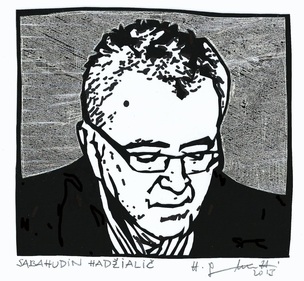
Copyright © 2014 DIOGEN pro cultura magazine & Sabahudin Hadžialić
Design: Sabi / Autors & Sabahudin Hadžialić. Design LOGO - Stevo Basara.
Freelance gl. i odg. urednik od / Freelance Editor in chief as of 2009: Sabahudin Hadžialić
All Rights Reserved. Publisher online and owner: Sabahudin Hadžialić
WWW: http://sabihadzi.weebly.com
Contact Editorial board E-mail: [email protected];
Narudžbe/Order: [email protected]
Pošta/Mail: Freelance Editor in chief Sabahudin Hadžialić,
Grbavička 32, 71000 Sarajevo i/ili
Dr. Wagner 18/II, 70230 Bugojno, Bosna i Hercegovina
Design: Sabi / Autors & Sabahudin Hadžialić. Design LOGO - Stevo Basara.
Freelance gl. i odg. urednik od / Freelance Editor in chief as of 2009: Sabahudin Hadžialić
All Rights Reserved. Publisher online and owner: Sabahudin Hadžialić
WWW: http://sabihadzi.weebly.com
Contact Editorial board E-mail: [email protected];
Narudžbe/Order: [email protected]
Pošta/Mail: Freelance Editor in chief Sabahudin Hadžialić,
Grbavička 32, 71000 Sarajevo i/ili
Dr. Wagner 18/II, 70230 Bugojno, Bosna i Hercegovina





